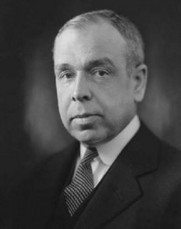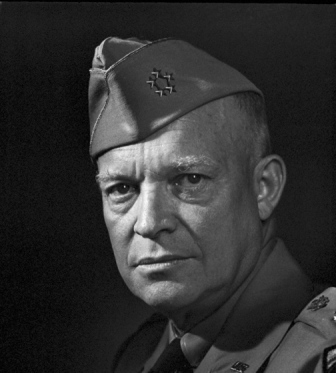|
restoring our biblical and constitutional foundations
|
| welcome |
April 2011 Blog Archives
Saturday, April 30
7:52 PM Odds and ends ...
1) Somebody please hit me with the stupid stick. I told you that I had co-edited a book review with my student Paul Himes. Well, it was with another student. Do yall give grace for senior moments?
2) I'm starting a teaching series at Rock Spring Baptist Church tomorrow morning. Services will also be held Sunday to Wednesday evening (7:00 pm). If you live near Louisburg, NC, and want to pay us a visit, come on!
3) Musings on the movie Soul Surfer. I think Becky and I are going to pass on this one.

4) What? Interpreting Romans 13 in light of its context? Unthinkable!
5) Here's an entry in the "Oddest Essay Titles" category. Let's see, chaplains passing wind....?
7:14 PM A brief You Tube video of today's festivities:
7:04 PM Just woke up from a short nap. During my nap I dreamt I saw hundreds of acres of hay fields, with squares bales every 15 feet or so. The bales seemed to go on forever. I thought to myself, How in the world am I going to get up all of these bales before it rains on Tuesday? And then I woke up.
And now, back to reality. Today's Work Day for Missions was a smashing success. Here's why:
If we look a little bedraggled, we should. We worked from 8:00 to 5:00 with breaks only for snacks and lunch. Because of the labor of these fine people, Becky and I will be donating $1,480 to the Ethiopia Fund at Bethel Hill Baptist Church tomorrow. Never have I worked with nicer people or for a better cause. My thanks to everyone who participated, young and old alike. You'll never how much you mean to Becky and me. I hope we can do it again real soon. (That is, after my feet stop hurting.)
A few pix in case you're interested:
1) The wood chipper got a workout today. It ran practically non-stop and worked almost flawlessly. A shout out to Bo's Hydraulics of South Boston, VA, for giving us a nice discount on its rental price.
2) The Bethel Hill youth were well represented today. Here Lendon shows off his big brown eyes.
3) Several of my Greek students were able to help us today, including Moncy (who hails from Calcutta, India) and Tyler. Some students will do anything for a good grade. (Just kidding, you guys. You know I appreciate you.)
4) Our pastor's son. A chip off the old block, you might say.
5) Becky and Karen supplied us with morning and afternoon refreshments as well as a fantastic lunch. Thank you, ladies, for working so hard in serving us.
6) Here's my Sunday School teacher. Chris is one Christ-loving dude, and a man who's not afraid to get dirty for the sake of the kingdom. Love you, brother!
We finished only about half of what we needed to do today. The wood chipper is due back at 7:30 Monday morning, so I'll be getting up early tomorrow morning to try and get our money's worth out of the rental. Care to join me? See you at 6:00 am sharp! (Just kidding, Ed!)
Again, our heartfelt appreciation to everyone who came today. You are fabulous Ethiopian missionaries. Great is your reward in heaven!
Friday, April 29
7:44 PM Don't read this unless you are a bookstore lover. (Note: My favorite bookstores in the world are located in London's famous Piccadilly Circus. Even the Archives Book Store in Pasadena can't beat them.)
7:36 PM I totally agree with Jessica Hall that Hitchcock's most suspenseful scene comes in Rear Window when Thorwald discovers he's being watched. Cinematography at its very best!
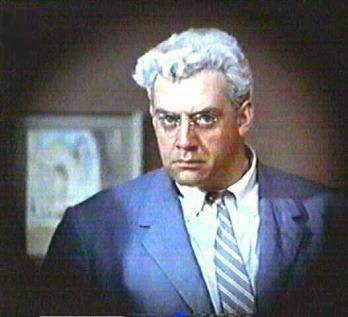
7:22 PM Good read: Theologie betrifft jeden.
Theologie betrifft jeden. Niemand kommt ohne Theologie aus. In gewissem Sinne ist jeder Mensch Theologe. Und gerade hier liegt das Problem. Es geht nicht darum, ob wir Laien- oder Berufstheologen sind. Problematisch ist es nur, ein unkundiger oder gedankenloser Theologe zu sein. Darum muss sich eigentlich jeder mit Theologie befassen.
Well said!
7:12 PM Newsflash! The latest issue of the Criswell Theological Review is out. Go here for the table of contents. And don't forget to read therein a book review published by one of my doctoral students, Paul Himes. It's his first published review ever. Congratulations to you, Paul!
(Confession: I "co-authored" the review with Paul, but he did all the work. Initial reviews by students must be accompanied by the name of their major professor. Paul's work sure does bring back memories. While working on my own doctorate many years ago I tried to publish as many book reviews as possible in as many journals as possible. This included a new journal called the Criswell Theological Review, which at the time was being edited by an up-and-coming young scholar named David Dockery, with whom I went on to co-edit two books for Zondervan and Broadman & Holman. Who can tell what the future holds for young scholars like Paul. Glad to support them in any way I can.)
6:55 PM If you enjoy studying the book of Philippians as much as I do, you will want to check out these helpful study notes.
6:45 PM Here's how you can help the disaster relief in the Southern States hit by the recent tornados.
6:34 PM Brief farm update ...
1) Just back from South Boston where I rented this 6-inch wood chipper. We bought another one (which was unloaded today and which I still have to assemble). Both will get a good workout tomorrow, Lord willing.
2) As you can see, Nate began cutting hay today. Just a couple of our smaller fields. The poor guy. No one suffers more from hay fever than he. Yet, I think, no one enjoys farming more than he.
3) One of our very best friends, Karen, is here visiting us. Karen and her husband Don have 9 children and, as you can see, are expecting their 10th in June. We dragged Karen away for the weekend, insisting she needed some rest. Don and the remainder of the clan will join us here on Sunday. They are a super wonderful family and dear Christian friends.
Right now Becky and Karen are on the front porch talking girl talk. The last thing I heard Becky say to Karen was, "Well, what should I do with my hair? Keep it short or let it grow?" My answer would be definitive:
Let it grow, let it grow, let it grow!
12:23 PM Heather Joy (whose blog is called Grow Up!) reviews Life, In Spite of Me -- the inspiring story of one woman's journey through depression. A sampling:
Kirsten Jane Anderson tells her story how she lay down on cold, icy train tracks just days after the New Year and tried to end her life. Thirty-three freight-train cars ran over her legs at fifty-five miles per hour before it came to a screeching halt. Expecting her life to be over, she looked down and saw her legs laying several feet away from her body – and she realized her worst nightmare had come true. She was alive… her suicide attempt was a failure.
I'd also like to recommend my wife's essay Coping with Trauma. My thanks to all of these ladies for their transparency and encouragement.
11:58 AM Quote of the day (J. Gresham Machen):
From the beginning, Christianity was certainly a way of life; the salvation that it offered was a salvation from sin, and salvation from sin appeared not merely in a blessed hope but also in an immediate moral change. The early Christians, to the astonishment of their neighbors, lived a strange new kind of life—a life of honesty, of purity and of unselfishness. And from the Christian community all other types of life were excluded in the strictest way. From the beginning Christianity was certainly a life.
11:20 AM Kevin Brown muses about mediocrity. When you get to be my age you realize there is very little you can change about yourself. Habits seem firmly entrenched. The temptation to give up, slow down, flake out is very real. Do I give in? All the time, sad to say. Jesus, however, is unambiguous about this subject in His Sermon on the Hillside. What do you really value? What are you seeking after? What is your primary ambition in life? You cannot serve God and this world at the same time. He warns us about giving priority to things (like clothing) that simply wear out with time. He tells us to put our treasure where it cannot be stolen. In terms of commitment, disciples of Jesus should stand out in sharp contrast to this world.
Kevin is right. We need to do better. But worrying about all this is useless. Anxiety, as our Lord said, can't add one day to our life or a few inches to our height. Worry means that we do not trust God for our failures, our mediocrity, our sloth and complacency. In a world marred by sin, mediocrity is inevitable for everybody, even Type A personalities. What we can do is to take baby steps forward. We can ask God to show us where we lag behind, and then ask Him to nudge us ahead a little bit. It can perhaps mean asking God: How can I be a better husband, a better parent, a better student, a better teacher, a better worker this year than I was last year? It might mean notching it up one bar even in areas in which you might excel. I never teach a class when I do not ask myself, "What one thing can I do this time around that will improve this class?" Here on the farm I've been learning how to do basic maintenance jobs without asking (or hiring) others to do it for me. Talk about raising the bar! (Klutz is my middle name.) Short as life is, I believe I can yet make progress in almost every arena of my existence.
As Kevin reminds us, Jesus is our model. He practiced what He preached. He told us to be about the Father's business, then He showed us how to do that: By walking daily in the Spirit and by trusting the Father. So, brother Kevin, I can empathize with you. Your words remind me that I am not about the Father's business as I should be. Yet worry is unnecessary. Nobody works harder than a bird, but birds neither worry nor hoard. They trust. And it is not without significance that God allows us to see these little creatures every day of our lives. They show us the way forward.
8:34 AM This week in Baby Greek we introduced a couple of terms that are often referred to as interjections, including the word ouai, which has often been rendered as "Woe!" This word is used frequently in Matthew 24 with reference to Jesus' opponents. It is an onomatopoeic word, and takes us to the very heart of Jesus. He pronounces "woes" on His enemies, not because He hates them, but because He loves them. Just read verses 37-39, which are among the most poignant words in Scripture. Yes, Jesus loves them, and He will even send them prophets, wise men, and teachers (v. 34). Jesus reaches out to all, even those who hate Him.
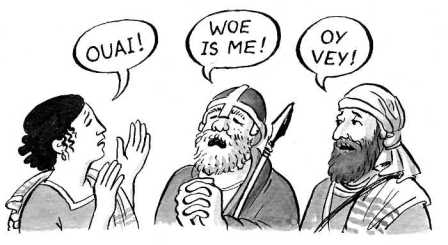
Some have asked Becky and me if our mission team will go to Alaba this November. This is the Alaba where the church is suffering, where being a Christian often involves persecution and not infrequently death. But the mission must be undertaken, or the heart of Jesus would burst. Just as He loved the viper's brood, just as He loved those play actors, just as He loved the very people who would commit the monstrous act of putting Him to death, so He loves those who would be His enemies today. The word ouai is not simply a term of judgment. It is a wailing lament of one who mourns and even weeps over the lost of this world.
So the question I ask is, Do you have this heart? Do I?
8:22 AM In one of my classes recently my students went on a rabbit trail. (I give them a long tether.) Questions were raised about a program used by certain missionaries, and whether it was scriptural. I am so grateful for the cordial and loving manner in which the issue was discussed. There is nothing wrong with questioning our man-made evangelistic strategies. That's why we need to ask a test question of everything we do: Is this really helping to build up the kingdom? God has given all of us the ministry of reconciliation, but we are assigned different places in the harvest. Love should rule among the workers, but all too often we're divided around pet doctrines and human personalities. Unless basic Christian doctrine is compromised, we should support each other as much as we can as each of us tries to do our part. Because there is only harvest and one Lord of the harvest, we need to work together and support each other.
Someone once approached Dwight L. Moody and told him, "I don't like your method of evangelism." Moody asked him, "Well, what is your method of evangelism?" The man replied, "I don't have one." Moody responded, "I like mine better."
As we begin to fully understand the principles of the kingdom together, we will learn to work with others who don't look exactly like us, think exactly like us, and act exactly like us. Let us pray for greater unity and cooperation. Perhaps God will grant it!
Thursday, April 28
9:32 PM You'll never guess what B and I watched tonight. An episode of Hawaii-5-O. Lousy story line but great acting. And the scenery -- well, what can you say about Hawaii other than that it truly is the Paradise of the Pacific. The first few episodes were filmed while I was still in high school (and while Obama was still in elementary school), and the fashions were very 60s. Did we really look like that? And poor McGarrett, having to wear a coat and tie in all that humidity. I never saw a cop dressed that way while growing up. (We called that "dressing mainland.") And the man had no sweat glands. I challenge you to find one scene in which he perspired. But who cares? The series is worth watching if only for its theme song (which is the greatest theme song of all time and the unofficial theme song of the University of Hawaii).
7:18 PM New Testament students have yet another good reason to consider St. Andrews for doctoral studies: Scott Hafemann. Kudos to you, Scott, and a big thank you to Nijay for the link!
7:02 PM I am practically in tears as I write this. A student of mine just emailed me to say that he and 4 others from his church in Fayetteville, NC (almost to South Carolina!) will be coming to our Virginia farm for Missions Work Day. Another student of mine, a pastor, said his church wanted to help but they already had another outreach planned for Saturday, so they decided to take up an offering instead (it amounted to just over $1,000). For my wife and me, it is our continuing prayer every day for God to save the people of Alaba, Ethiopia. I am convinced that the time is right, despite the severe persecution of the church. The whole thing boils down to this: All the suffering and the pain are forgotten when one soul comes to faith in Christ. What a glorious promise. What a change from the yokes fashioned by the world around us. Jesus saves! If soldiers can die for their country, isn't true servanthood the least we can offer to our Savior?
Below: The site of the Zobechame church meeting hall. Construction has now begun, thanks to the generous donations of God's people in North America.
Here is the two room school house we have already built on the property. Here the children from the surrounding Muslim neighborhood are exposed to the love of the living Lord Jesus.
Praise God from whom all blessings flow!
6:20 PM Odds and ends ...
1) Just back from eating out. We were both too tired to cook. Went to the local Chinese place. Good food, good prices.
2) Becky is now cooking up the Sloppy Joes for Saturday's work day. You should come, if only for the food.
3) The whole farm is bursting forth with color.
4) These fields are "ripe unto harvest." I think Nate may start cutting tomorrow. Just think -- our first hay crop of the season. Always the most enjoyable one.
12:06 PM "The best teachers have an intuitive understanding of the learning process." That one really got me thinking. For me, understanding the learning process has not been very intuitive; I've had to enroll in the school of hard knocks. For example, here's one lesson I've had to learn the hard way: Whenever we simply ask our students to fill in their notebooks while we lecture, education tends to be curtailed and genuine learning retarded. This is because of what I call the First Law of Paid-agogy.
I started mulling over this law after I began lecturing at Biola University back in the mid-70s. My pattern of lecturing was the one my teachers at Biola had used. As a student I used to call it the "You Sit Still and I Instill" method. That is to say, I was under the impression that my job as a teacher -- what I was getting paid to do (hence the title First Law of Paid-agogy) -- was to disseminate information. The more information, the better. As the years went by, however, I couldn't help saying to myself, "I wonder just how many of these facts my students will remember after they've graduated?" Then I had a brain trickle. "Why not allow the students to get all the hard facts by reading the textbook before become coming to class? If I did that, could I perhaps spend class time focusing on more relevant (and intrinsically important) material?" The more I pondered these questions, the more it seemed obvious to me that "less is more" works in the classroom as much as it does in any other venue of life. To be sure, I still felt it was my duty to see that my students learned the hard facts of the discipline they were studying -- New Testament Introduction, for example. My only question was, "Why spend valuable class time lecturing over this material when the students can get it in one fourth the time by reading it in a textbook, especially a well-written one?" (Wink, wink.)
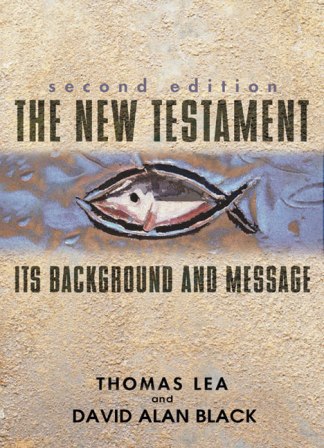
The First Law of Paid-agogy tries to do too much and it fails almost every time. It's hard for me to imagine a greater waste of class time than having my students fill in their notebooks with information. There is no nurturing of the mind. It is a key reason why so many students who attend large lectures actually spend their time in class on Face Book or in tweeting when they "should" be taking notes. Students know a boring lecturer when they see one, I like to say.
(I might add: There is no such thing as a boring teacher. If he or she is boring, he or she is not a teacher.)
There is an obvious parallel between one's method of teaching and one's method of testing. In my large lectures on the New Testament, for instance, I focus on macro-issues, and then I have students write essay exams discussing these issues. Essay exams kill two birds with one stone: They require students to express themselves actively and verbally, and they require an issue to be discussed in detail. On the other hand, multiple choice exams that test to the lectured-upon minutiae fail to do anything but force students to memorize a myriad of facts they will forget the minute the exam is over. (This, by the way, is called the Second Law of Paid-agogy.)
Now, if we should decide to major on the majors in class as well as on our exams, this has implications for class attendance. The key to attendance is not a class roll. It is making the lecture sufficiently interesting and intrinsically useful that students will want to attend class. At first I didn't understand this -- and then it clicked. Give the students the freedom to attend class or not! Make attendance voluntary! You say, "That's crazy!" I say it works, both for the student and for the administration, because it puts a premium on good classroom teaching.
And that's really what we should be talking about anyway.
9:10 AM Last faculty meeting of the year yesterday. Enrollment this year is way up. Another record year anticipated for the fall. God has been inordinately good to us.
In preparation for our summer faculty workshop we were asked to read What the Best College Teachers Do by Ken Bain, who directs the Center for Teaching Excellence at New York University. I read it in one sitting last night. A few take-aways:
-
The best teachers "reach" their students intellectually and leave then wanting more.
-
The best teachers are active and accomplished scholars.
-
The best teachers have an intuitive understanding of the learning process.
-
The best teachers reflect a strong trust in students.
-
The best teachers treat their students with simple decency.
-
The best teachers give students a safe space in which to construct ideas.
-
The best teachers avoid extrinsic motivators and foster intrinsic ones.
-
The best teachers avoid using grades to persuade students to study.
-
The best teachers help students keep the larger questions of the course at the forefront.
-
The best teachers expect the highest levels of development from their students.
-
The best teachers create a strong desire in their students to read in the discipline.
-
The best teachers set high standards and convey a strong trust in all their students.
-
The best teachers realize that learning takes place not when students perform well on examinations but when they evaluate how they think and behave well beyond the classroom.
-
The best teachers ask their students for a commitment to the class and to learning.
-
The best teachers use class time to help students think about information and ideas the way scholars in the discipline do.
-
The best teachers have the ability to communicate orally in ways that stimulate thought.
-
The best teachers display not power but an investment in their students.
-
The best teachers ask students to assess themselves.
-
The best teachers know they always have something new to learn.
I am grateful for this book. Already it is helping me to think through my own philosophy of teaching. We teachers are little servants of a Great Master. We need to reflect well on Him in all we do, inside and outside of the classroom. There are abiding principles that can be learned and lived by any teacher. The key is to act on them.
Later I'll offer some thoughts about my own approach to the classroom based on 34 years of experience.
Wednesday, April 27
7:40 PM Interesting thread here about the use of Greek interlinears. (Thank you, Brent, for pointing it out to me.)
7:20 PM My new motto: Deo optimo maximo.
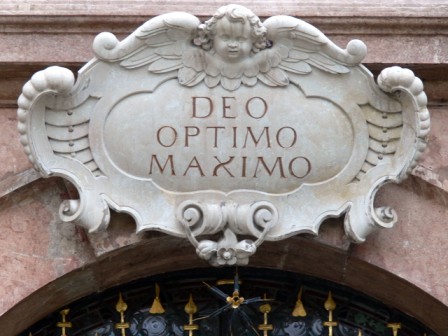
Jim Elliott put it this way: "Wherever you are, be all there, and live to the hilt whatever you are convinced is the will of God for your life." I fall so short, but that's my goal. Would you pray for and with me that I might attain it?
7:14 PM Conference announcement: My colleague in Old Testament, Heath Thomas, will be giving a lecture at Calvary Baptist Church in Winston-Salem, NC, on Saturday, May 21, from 9:00 to noon. His topic will be the book of Lamentations. For more information, go here. And for my interview of Heath about his latest book, click here.
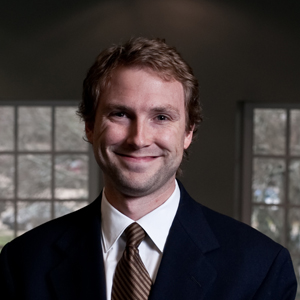
6:40 PM Odds ends …
1) Allan Bevere says Nothing is Mere Doctrine. He writes on a topic I have often struggled with.
2) How teaching is best learned – by teaching. Christian education is likeness education (Luke 6:40).
3) Looking for a good deal on a Greek New Testament? Go here.
4) Look who's been spending too much time on the internet. Am I guilty too? I hope not. One thing is certain: If I ever find myself being less productive in writing books, then I'll know I've been spending too much time on the web.
5) Chuck Colson asks Would Jesus Get a Tattoo? Not sure I agree with his answer (the matter seems to be a gray area) but his essay is worth reading.
6) Did you remember to honor your secretary today? I did. Our quad could not make it without the able assistance of Miss Phyllis.
7) It's official: I was born in Honolulu, Hawaii. (Oh, and so was the president. Will the idiotic conspiracy now die a well-deserved death? Not on your life. The Birthers could care less about truth.)
6:31 PM T. C. Robinson pays tribute to the King James Version. I cut my eye teeth on the Old Schofield Reference Bible, King James Version. But it wasn't until I began reading another translation that I can say that I truly "fell in love" with the Bible. That new translation was called The Good News for Modern Man New Testament, which was first published in 1966 when I was 14 years old. I simply could not put it down. As an artist I found the line drawings visually attractive, and as a young believer I found the glossary extremely helpful.
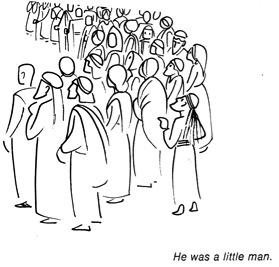
It was the version God used to help me move away from being a shallow Christian who couldn't turn the next corner in life let alone turn the world upside down for Jesus.
I'm convinced God uses different Bibles for different purposes in different lives. To all who follow Christ, there is no need to despair of a shortage of good English translations to help us grow and mature in our faith. As far as I'm concerned, any legitimate Bible version that can help us get connected to Jesus, the Head, as well as help us to submit to the kind of dead-to-self life that He can use for His glory, is a good translation.
Tuesday, April 26
6:18
AM
Am very excited this morning to be returning to campus after a week off.
As I do so I'm reminded of something Ray Ortlund, former pastor of Lake
Avenue Church
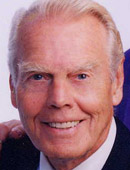 in
Pasadena, once told a group of fellow pastors. He said that once in a
while they should lean over their pulpits and tell their congregations
how much they love them. He said people in the pews need to hear these
words from their pastors. He said, you may feel awkward in doing so, but
do it anyway!
in
Pasadena, once told a group of fellow pastors. He said that once in a
while they should lean over their pulpits and tell their congregations
how much they love them. He said people in the pews need to hear these
words from their pastors. He said, you may feel awkward in doing so, but
do it anyway!
Have I, as a professor, ever told my students "I love you"? Yes, but not often enough. Christ loved the church and gave Himself for her. "Church spirit" is never built by putting others down. Love is the chief mark of authenticity, whether you are a teacher, a pastor, a lawyer, a farmer, or whatever. We don't have to work it up; He sends it down. Seminary education demands a lifestyle of relationships. Anyone can create an organization, but only God can create a true community, a genuine Body, a throbbing, vital organism. Oh, may Southeastern Seminary be known, not for its academic prowess, but for its success in expressing tenderly the implanted love of God in outward and visible expressions of all kinds. Only then will passion for the nations be both "caught" and "taught" throughout the entire student body.
So students, I say to you today:
I love you.
Monday, April 25
9:06 PM Sweet visit with the Blacks this evening. That Nolan is a growin'! Becky snapped some pix:
8:54 PM Greatly honored and humbled that Elgin Hushbeck should have taken the time to review Why Four Gospels?
6:15 PM I have now finished reading Clifford Dowdey's magnificent biography of Robert E. Lee. Many people do not realize that at war's end Lee became a professional educator. And an excellent one at that. As the president of Washington College in Lexington, VA, Lee placed his students on their own responsibility, much as he had with the soldiers under him. "To Lee," writes Dowdey,
education for the future depended as much on character as learning, and to him character was built upon the habits of self-control. He did not believe that intelligent self-government in men would be promoted by forcing students under compulsion, supported by penalties, to perform class assignments and conform to rules of personal behavior.
Dowdey goes on:
He believed that by giving young men the opportunity to think and act for themselves, they would form the habit of making the proper choices.... With this attitude, he refused to encompass students with regulations and petty rules, nor would he have them watched over -- "espionage," as it was called at the college -- as if they were unable to govern themselves.
When students abused this privileged, they were called into the president's office. Notes Dowdey:
It was not his custom to reproach the boys. He advised them. One of his former students, who was himself never called to Lee's office, wrote, "I have heard the boys who were say his admonitions were as tender as a mother's and his warnings and instructions always fatherly and wise."
The bottom line?
The men were proud of acting on their honor, and they obeyed Lee, one said, "not because they feared but loved him...."
I could not agree more with this approach to education, at least in seminary and graduate school. The honor system that Lee established is still in effect at what is now called Washington and Lee University. It has stood the test of time, because it is based on sound pedagogy.
Below: Lee as a civilian just before his death in 1870.
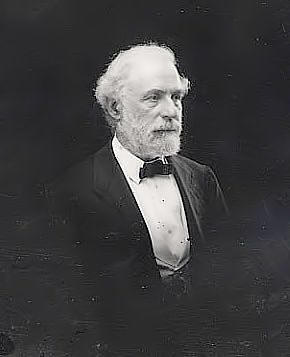
5:14 PM The library at UNC Chapel Hill has a fabulous website that follows the Civil War day by day. If you are at all interested in American history I recommend that you take a look at the site. It mostly contains short stories and personal reminiscences. Since this is the 150th anniversary of the war, I would also urge you and your family to consider attending one of the major reenactments that are being planned over the next four years. Of course, this year will feature the famous battle that took place along a meandering creek in northern Virginia. The official website is called ManassasBullRun.Com. The dates are July 21-24. Although I abhor war, I think it's important for all Americans to become familiar with this era of our history. The battle claimed the lives of 878 soldiers and wounded another 2,489. Here General Jackson earned his immortal nickname "Stonewall," and here both sides realized that the war would be long and bloody. I have reenacted this battle in the past, as well as many other major battles (Sharpsburg/Antietam, Shiloh, etc.), and I can tell you from personal experience that the 1860s truly come alive when you catch a glimpse of what it must have been like to live through those dark days. The First Battle of Manassas was truly An End to Innocence.
Below: Ruins of the famous stone bridge, taken after the battle.

1:42 PM Did you know that every 45 seconds someone dies from malaria? And did know there's an organization dedicated to ending malaria in Africa by the year 2015? I heard about it while listening to the Diane Rehm show on NPR this morning. As someone who can no longer donate blood to the Red Cross because of malaria I was keenly interested both in the organization (Malaria No More) and the church that sponsored the radio ad: The United Methodist Church.
By the way, today is World Malaria Day. I say that with some empathy. I believe the Lord allowed me to contract this disease so that I could more easily identify with malaria sufferers where we work in Ethiopia.

And no, I see no contradiction between social work and the Gospel of the Lord Jesus Christ. Of course, presence without proclamation is a grave mistake, and all too many "Christian" charitable organizations do just that. That said, the social implications of the Gospel are inescapable. The Gospel is the root, good works are the fruit. If there is life in the tree there will always be fruit on its branches. A Gospel that lacks concern for people's needs is no Gospel at all. If I believed otherwise Becky and I would never have established our health center in Southern Ethiopia three years ago. It is obvious to me that evangelism and social compassion go hand in hand. The social Gospel can, of course, never replace the personal Gospel; but I think we conservative evangelicals err perhaps too far on the side of mere decision-making. Let the cup of cold water be given, but let it always be given in Jesus' name and with a view toward evangelism!
10:38 AM Quote of the day:
I appreciate the zeal of Jim Wallis and others for the poor, I just would desire that they would stop placing their faith in the worst possible vehicle for alleviating poverty (i.e. the confiscation of property from one class of people and transfering that property to another class of people by a secular state via coercion and under threat of imprisonment). The Federal government can never tax enough, spend enough, borrow enough to end poverty and in fact all of the spending/taxing/borrowing for the last four decades has actually made poverty worse and indebted the nation.
Read When you fast ... be sure to spread the news about it!
9:54 AM Why was Dwight Eisenhower chosen to lead the allied army that would storm the shores of France on D-Day? According to Stephen Ambrose, it was his ability to work well with others. Writes Ambrose (D-Day, p. 66):
The key word was "team." Eisenhower's emphasis on teamwork, his never-flagging insistence on working together, was the single most important reason for his selection.
The early church, too, worked as a team, and it was unified around one thing: the Gospel. One cannot fail to notice this priority: there was one Lord, one faith, one baptism. There can be little doubt that when Paul talked about unity it is because Jesus had already affirmed its importance among His followers (John 17). The early church had one over-powering passion. They were consumed with a love for Christ, a love that spilled over into a love for others. Philippians speaks of struggling together for the faith of the Gospel, of putting aside our selfish interests and placing the needs of others before our own. It is an amazing thing that Paul should have believed that his churches could be unified. But indeed he did! And what a privilege that is for us today.
I know of nothing that will unify the Body of Christ quite like a common concern for the lost -- those who are out of touch with the God we know so personally.
Sunday, April 24
8:05 PM What, not another essay by Eric Carpenter on the Lord's Supper!
It would not be needed if we were following New Testament patterns. In earlier times the event was a gigantic celebration. The Christians in New Testament days put first things first by focusing on the Savior. With us, first things often come last. And the "Lord's Supper" is thereby transformed from a joyful celebratory meal into a dull, dreary duty. At Bethel Hill this morning we ate together as a church and then -- lo and behold! -- we found the bread and the cup being passed around as we ate and talked and shared.
It certainly taught me a lesson. It reminded me that our gatherings never need be dull, unimaginative, or repetitive. It was not difficult to think back to Acts 2 and to be reminded that the Breaking of Bread was a priority to the early Christians. Their koinonia was vibrant, full of love, warmth, and vitality. This is the sort of Christian fellowship I desire, and it can be a reality.
To our church elders I say thank you. Thank you for helping the Body to express in a tangible way the Gospel. If I am not greatly mistaken, the Lord's Supper, unlike the Jewish Passover, was observed much more often in the early church than it is today, probably every week on the day of the resurrection. And since every Sunday is Resurrection Day, I suppose the implications for future observances is obvious.
2:06 PM "Whatever else the resurrection does, it leads to the Great Commission." These words, or ones very similar to them, were part of Jason's excellent message this morning during our annual Easter Sunrise Service at the Dawson's home on the lake.
Jason was referring, of course, to verse 21, in which Jesus is recorded to have said, "As the Father sent me, so I am sending you." What a marvelous truth! It got me to thinking. The resurrection of Christ is the springboard for missions. Without it there would have been no Great Commission. With it, how can we remain silent?
Those of us who have put our faith in Christ undergo great changes in our lives. Perhaps the greatest of these is the act of committing ourselves to live for others rather than ourselves. When Jesus rose from the dead, He gave us a brand new purpose in life, and we who follow Him are now to be His voice and His hands and His feet in this world. Jesus changes everything. And it was Easter Sunday that launched the church on its mission. Emil Brunner put it succinctly when he wrote (in his book The Misunderstanding of the Church, p. 50):
One thing is supremely important; that all minister, and that nowhere is to be perceived a separation, or even merely a distinction, between those who do and those who do not minister, between active and passive members of the body, between those who give and those who receive.
The modern missionary movement has the whole world as its target, and it has each and every one of us in its workforce. We go forth, as did our Master, not as high-pressure salespeople but as ambassadors of the living God. The shared enterprise of missions brings with it unspeakable joy and fellowship. And this "mission" we are talking about goes back to the fountainhead called the resurrection. It thus goes back to Jesus.
We should be foolish and disobedient to celebrate Easter without accepting this command of going. That is to say, ministry is based upon the reality of a living Christ among His people. It should hardly surprise us, then, that every Great Commission text is found in a resurrection narrative. The disciples of Jesus were all expected to be equally committed to the Teacher's cause, and equally concerned to take the Good News to the ends of the earth.
This is no less true of us today, regardless of the particular role we might play in that great cause.
Saturday, April 23
7:34 PM Reading Matthew with Tom Wright. A great Easter Message!
10:04 AM I have begun reading Stephen Ambrose's classic book D-Day. The work is surprisingly disappointing. I wish the author had done better fact-checking. Three examples:
1) On page 33 he writes: "They [the racial Germans] were classified as Abteilung 3 dur Deutschen Volkslists (Section 3 of the German Racial Lists)." Of course, the German definite article is never spelled "dur." (The correct form here is "der.") Also, the word "Volkslists" should be "Volksliste."
2) On page 35 the author refers to "members of the Nazi Youth." The correct name for this organization is Hitler Youth (Hitlerjugend).
3) On page 36 Ambrose refers to "Gen. Guenter Blumenstedt (chief of staff, Oberbefehlshaber West -- OB West, the German ground headquarters of the Western Front." Any student of WW II history will immediately recognize the error here. The general's name was Blumentritt, not Blumenstedt.

Little foxes sure do spoil the vine, at least for this reader!
8:11 AM Over at The Christian Century, Robert Cornwall reviews a book with an interesting title: Part-Time Pastor, Full-time Church. Bob writes:
Pastoral leadership is just one side of the coin, as these congregations will have to take on responsibilities that are often reserved for clergy—such as visiting the homebound and the hospitalized. Congregations will have to take a close look at their structures to make sure that they are flexible enough for them to work effectively with the pastor. Finally, congregations must decide what they value most in a pastor: good preaching and worship leadership, ability to advise and counsel members, effectiveness in supervising other staff members, or other qualities.
"Congregations will have to take on responsibilities that are often reserved for clergy" -- I could not have said it better. Bob, by the way, is the author of the Areopagus title Ultimate Allegiance: The Subversive Nature of the Lord's Prayer, which is reviewed here.

8:04 AM I love my faculty colleagues. They are great men and women, excellent teachers, and accomplished scholars in their fields. When asked about our academics here at SEBTS, I often send people to the Chronicle of Higher Education, which lists 375 schools that offer the Ph.D. according to their "faculty scholarly productivity." You might be pleased (or shocked!) to know that Southeastern ranks number 5 in the category of theological studies, just after Chicago, Notre Dame, Princeton, and Westminster. You can look at the list yourself. Keep in mind that we are not a research institution but a seminary that trains men and women to become Great Commission Christians. Truly God has assembled here a wonderful faculty. As God blesses, I hope to see our faculty publish many more books in the years to come, to the glory of God alone.
7:55 AM Greek students, be sure to check out the Roberts Memorial Greek Web Page. What will you find here? The question is, What won't you find here? While you're at it, make sure you look at Roberts' introductory grammar of New Testament Greek. A most useful resource if you ask me.
7:50 AM Interesting essay: The Authorship and Publication of the Gospel of Mark.
7:42 AM "Many hands make light work." We're hoping many of you will be here for our Missions Work Day. It's coming up a week from today. Brings your chain saws and gloves. And please RSVP if you plan to attend: dblack@sebts.edu.
7:36 AM Would C. S. Lewis have approved of tenure? Read about it here.
7:23 AM Agro-fan Rick Saenz is no longer championing his cause. I say, Amen and amen! Rick writes:
To those who are attracted to a strong prophetic stance but uneasy about its temptation to indignation, anger, pride, self-righteousness, contempt, condescension—it doesn’t have to be that way. The thing you feel called to denounce should be matched by a godly counterpart you have embraced. Forgo the denunciation, and redouble your embrace! The good thing you exemplify will itself serve as a rebuke to the corresponding wickedness, without any additional help from you. And the fact that you have visibly managed to live out your ideal will say infinitely more to your listener more than any words you offer extolling a way of life that is merely speculative for both of you.
Rick argues that we can be prophetic and irenic at the same time. He also says that the best admonitions are based on example, not words. For someone who loves the agrarian lifestyle, I couldn't agree more. Thank you, Rick!
Friday, April 22
3:34 PM Odds and ends ...
1) More anti-Christian violence in Ethiopia.
2) Brush Ashford reviews Counterfeit Gospels.
3) Blessings on fellow blogger Brian Fulthorp and family as they move from the Grand Canyon.
4) Good article on the complexities of foreign adoptions here. (I note that Ethiopia has cut its adoption rate by 90 percent.)
5) Life is fragile, says Andy Bowden.
11:54 AM Quote of the day (Becky Black):
But in all of this, we must remember the Jesus was never a victim. He was never at the mercy of those who destroyed Him. Rather, He willingly placed Himself at their command, and He kept Himself under their command until the end had been accomplished. At any second, He could have used His power & authority to withdraw Himself and flip the circumstances. The angels stood in the heavens, awaiting His command to rescue Him. But no command came.
Instead, He yielded Himself to the Father’s will.
11:24 AM The proliferation of Bible translations in English continues.

This is not necessarily a bad thing. I once had a student walk up to me and ask, "Why should I bother learning Greek in light of all the English Bibles available to me today?" My answer was simple. "It is preciously because there are so many English translations that it is incumbent on you to learn Greek. How else will you be able to check their accuracy?"
I await Wright's new translation with eager anticipation.
11:08 AM The team of 18 or so missionaries we are sending to Ethiopia in November will be an amazing group. They'll all be veterans, eager to renew the cross-cultural connection with their sister churches in Alaba and Burji. Mistakes there will be, and Christ will cover them all with His mercy and grace. With the help of the Holy Spirit, our team members will work hard on removing their cultural blinders. I've made my share of embarrassing faux pas through the years. In the Middle East I once tried to shake the hand of my female tour guide when we were introduced. I quickly learned that this was unacceptable in that culture. Each country I've visited has its own courtesies and sensitivities. We've got to work hard to understand the tone of the societies we work in. In Ethiopia this problem is compounded by the fact that there are some 85 major sub-cultures, each with their own language and customs. When you cross cultural lines, the rules change. You just learn to start from scratch.
One thing Becky and I stress in our orientation meetings is the need for the missionary to reach out and enter the new culture. We believe that the greater the bonding, the more effective our work will be. Our men are asked to be willing to hold hands with other men in public, and our women are asked to dress modestly (blue jeans are culturally unacceptable down country in Ethiopia). We want to build a truly reciprocal relationship. The external level of social custom is one of the ways we can show them respect. You may look askance at eating coffee beans in your coffee here in America, but in the Guji tribe this is taken for granted. Now, I will always be different from the Gujis. For one thing, I am white! But I can show them I have genuine love for them, a desire to be with them, a willingness to serve them, and an acknowledgment that they have much to teach me. The barriers of foreigners can never be removed completely, but they can be minimized. But we must take the first step. According to 1 Corinthians 9, Paul tried to identify himself with the people whom he was seeking to help. Missiologists call this the "incarnational" principle. Without this effort to bond, all else is empty words.
Below: Eating coffee on my second visit to the warlike Guji tribe. This was a real test for me. I think I almost died, but drink it I did. The rest was smooth sailing.
Here's Miss Katy (who blogs here). She was 15 years old when this photo was taken. Despite her white complexion, she fit right in wherever she went in Ethiopia. Along with her dad and younger sister, Katy is planning on returning to Alaba this fall.
8:58 AM Certainly, "Good Friday" is aptly named. Bad news is good news, in the light of Scripture. The Christian does not rejoice over the chaos and confusion of life, the distress of nations, the suffering caused by a tornado or a tsunami. We do not gloat over the collapse of the world system. But we are asked to lift up our heads, because any way you look at it, God can bring life out of death and good from evil. I have lived in this old wreck of a world for 58 years and I live in the ruin of it today. Where would I be had not Good Friday occurred? All I lost in Adam's fall I gained in the redemption made possible through Calvary.

The Gospel is a gory, bloody story. It is repulsive to the "educated" and "refined" thinkers of our day. There is nothing lovely about crucifixion. But on that cross God provided a meeting place and a Mediator in His Son. "We have peace with God through our Lord Jesus Christ."
Dear blog reader, have you claimed the cleansing blood for yourself? Provision has been made for you at Calvary, and when we accept that provision we stand in the righteousness of God.
7:42 AM Looks like Jesus is coming back on May 21. After all, the billboards can be trusted, right?
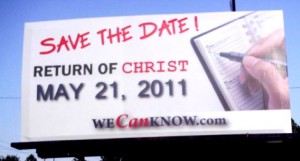
This bunk is adequately refuted here. I might add a few thoughts of my own:
1) Most Christians believe that Jesus could come at any moment. But we do not know the day or the hour.
2) It is neither proper to scoff at His promise of coming nor to get all worked up over it.
3) Luke 19:13 says, "Keep busy until I come." Whenever Christ's return is mentioned in Scripture, it seems that it is accompanied with sober counsel to be good stewards in the meantime.
4) Perhaps those who are most eager for Christ's return are the ones who need most of all to combine a sense of immediacy with faithful service until the Lord returns.
So: Are we busy about the kingdom?
7:25 AM Reading Aussie John's blog post this morning reminded me of something Aristotle wrote 2,500 years ago:
Young men have strong passions. They would rather do noble deeds than useful ones. They think they know everything and are always quite sure about it; this, in fact, is why they overdo everything.
Then he added:
Old men have lived many years. The result is that they are sure about nothing and under-do everything. They "think" but they never "know."
The generations need each other. We older men have much to learn from you younger men. Just try not to overdo it :)
7:18 AM Last Monday we ran into a Swiss family while visiting Grandfather's Mountain. What a delight to be able to speak German again. Wissen Sie, es fehlt mir im Sprechen an Übung. That is yet another advantage to studying abroad. You never realize the differences between Americans and the Swiss until you live and work closely together. And, unless you come to appreciate those differences, they can grate and irritate. I recall how my gregarious wife would walk down the street happily greeting everyone she passed. Needless to say, this is not a Swiss custom, at least not in Basel. When one is not cheerfully greeted in return, it is easy to conclude that the Swiss are rude and unfriendly. Nothing could be further from the truth, of course. It's simply a matter of culture and custom.
7:08 AM Charles Lamb once said, "If Alexander the Great or Charlemagne or Napoleon were to come into the room, we would all stand up out of respect. If Jesus Christ walked in, we would fall on our faces in adoration."
That is a very big difference, and we should always keep it in mind.
Thursday, April 21
7:42 PM The young ladies have arrived. After picking out their beds in the upstairs bedrooms they joined Becky and me for supper.
Right now they're getting down to business.
My job? Cook the meals, clean the dishes, and otherwise stay out of the way. (Right now I hear one of the girls reading Scripture. Awesome!)
4:48 PM More odds and ends ...
1) North Park University announces an opening in Youth Ministry.
2) The ideal Greek grammar?
3) Peer pressure on Palm Sunday.
4) Greek students at Mount Pleasant! Alan Knox has some Greek Interactive Flash Cards for you.
5) One benefit of the semester break: I'm getting some extra reading done. Last night I began I Was Hitler's Doctor. I have no idea idea where I got this book from. I found it during an archeological dig in my library. Needless to say the book is, well, interesting.
4:20 PM Got time for a brief word about blogging?
Recently I had an interesting email conversation with a blogging friend in Australia. We agreed that the blogging ranks have become a bit glutted these days. Both of us have pared down the number of sites we visit each day. I still enjoy blogging, but I'm not nearly as keen about writing about renewal as I am enthusiastic about doing it. I suppose it was a benign accident that my interest in ecclesiology and the explosion in blogging occurred about the same time. I am convinced that missional living is not merely a marginalia of New Testament Christianity but one of its central and most important themes. For the present, I will continue to offer my blog posts as a humble attempt to move the heart of God's people with the grandeur of His plan for the nations. It is a day for a radical commitment to visible equality between the wealthy church in the West and the less fortunate church in the Majority World. Such is the plain teaching of the apostle Paul in 2 Corinthians 8. Equipping for missions will also encourage every believer to cultivate the relationships around them and to use their discretionary time for kingdom purposes. Therefore, I believe it should be the primary task of bibliobloggers as well as the concern of every follower of Jesus that the saints be equipped for their ministries both in the church and in the world. No longer can we favor the professional minister and slight the non-professional one. Such an attitude only hinders the mutual service by which the Body of Christ is edified and the world evangelized. Michael Green once called Paul's use of the public hall of Tyrannus "a most impressive piece of Christian opportunism" (Evangelism in the Early Church, p. 205). Could not our blogs function in the same way today? I am convinced that this is possible. This will bring the Christian blogging community together in a greater way. We need to learn how to agree to disagree on lesser issues and get on with the basic living out of the Christian life, mobilizing people for missions for the sake of world evangelism. I am sure that God is already using many of you who are reading this blog more than you realize. I hope that you will make a fresh commitment to becoming a missions mobilizer, all in order to glorify God.
8:28 AM Odds and ends ...
1) Yesterday we mailed two more Greek DVD sets. Interest continues in the series literally all over the world.
2) Tonight Becky is hosting 5 young ladies from our church for a sewing party. A side benefit will be good fellowship and spiritual mentoring.
3) The history of Maundy Thursday.
4) N. T. Wright has produced a new translation of the New Testament. Looks like he beat me to the punch. Or did he?
5) Two members of my Mount Pleasant Greek class have blogged about their experience here and here.
6) Have you seen this crazy tornado You Tube yet?
8:10 AM Hello blogworld. You will have noticed that I am a keen fan of tent-making missions, not only because I have tried to practice this in my own life but also because I consider every follower of the Lord Jesus to be in fulltime Christian service. This, of course, means bearing witness. What I find so interesting about those early 18th century missionary societies -- which arose outside of the established churches as "parachurch" organizations -- was their practice of soliciting untrained and un-ordained believers from all walks of life and sending them forth to the distant fields of the world. Thomas Haweis, preaching at the inauguration of the London Missionary Society in 1795, said:
A plain man -- with a good natural understanding -- well read in the Bible, -- full of faith, and of the Holy Ghost, -- though he comes from the forge or the shop, would, I own, in my view, as a missionary to the heathen, be infinitely preferable to all the learning of the schools; and would possess, in the skill and labour of his hands, advantages which barren science would never compensate.
This was a radical departure, of course, from the church's insistence that missionaries had to be episcopally ordained. Thus, in 1796, a party of 30 missionaries, with their wives and children, were sent out by the London Missionary Society to the Pacific Islands. Four of them were Dissenting pastors. The others included carpenters, weavers, tailors, bricklayers, a shopkeeper, a blacksmith, and a gardener. They were sent out, as Andrew Walls notes in his The Missionary Movement in Christian History (p. 166), "to live as church and family."
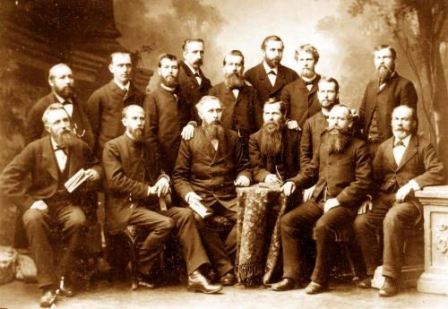
To live as church and family.
Is this not precisely what the earliest believers in the book of Acts did? For them, evangelism was never the task of the ordained ministry. Nor was evangelism an option only for those who felt "called" to do missionary work. They had no missionary societies. They were a bunch of nobodies who were commissioned by the Lord Himself to share their faith with others. It was much the same way with the Anabaptists in sixteenth century Europe. One cannot fail to notice the priorities of these persecuted Christians in this whole matter of evangelistic activity. They succeeded because they went against the grain of thinking among the Reformers.
Is it too late to see a widespread explosion of lay witness in our day? I hope not. The missionaries who were sent forth by the London Missionary Society had very different ideas about church life. We need more like them.
Wednesday, April 20
7:58 PM Click here to watch a brief You Tube of today's events.
7:43 PM Becky took lots of pix of our work day in Bethel Hill. Here are a few. As you can see in this first photo, the damage on the hill was evident everywhere you looked. This house is just down the street from the church. The tornado moved it off its foundation, and unfortunately the house had to be condemned.
Fallen trees led to considerable roof damage throughout the area. Disaster relief teams from all over the State were here in force to provide at least temporary protection from the elements until these roofs can be rebuilt.
If I do say so myself, disaster relief is one thing we Southern Baptists do exceptionally well. In charge of our own work crew was the indomitable Leigh Humphries, shown here along with her husband Marshall-the-Chain-Saw-Superman.
We have begun calling our fearless leader "Mama Leigh," a spin on "Mama B" (who is none other than my wife). Mama Leigh, you done real good today! Here brother Marshall attacks a tree with a vengeance. My own puny chain-saw wore out after an hour or so.
Marshall did leave a few projects for us lesser mortals, however. Here brother Ed does some fire wood sawing.
Note: none of this wood will be wasted. Each year the church delivers, free of charge, logs to several needy families in the neighborhood who heat their homes exclusively with wood.
Here Becky administers first aid (ice) to a young lady from a church in eastern North Carolina. Their youth group traveled all the way to Bethel Hill to help. Phenomenal! Thank you!
Pastor Jason is never too proud to lend a helping hand, no matter what the job might be.
In the meantime, brother Dudley shows that he must be a roofing specialist. He did a splendid job of replacing several of the roof tiles on this house near the church.
And here's a shout out and a huge "thank you" to Louisiana Pacific Lumber Company for underwriting a great Golden Corral lunch to all of our workers, served up by the ladies of the church.
They fed a ton of people.
Never was food more appreciated!
Here Mama Mary serves up some of her delicious coconut cream cake.
The local newspaper featured a story about one of our church families, the Jacobs. Their daughter was napping in her bedroom as the tornado arrived in Bethel Hill. Just seconds before a huge tree toppled over, right into her bedroom, her mother and father felt led to wake her up and move her to a safer area of the house. I wish you could read the entire story, but it's not available online. Needless to say, mom and dad gave God all the glory for the miracle.
I want to express my love and appreciation to all my co-workers today and especially to my brothers and sisters at Bethel Hill Baptist Church who have chosen to live Christianly before a watching world. If genuine love for others does not mark us, nobody is likely to listen to anything we have to say. The earliest Christians had a love for the lost -- those neighbors of theirs who were far away from the God they knew and loved. I dare say, Bethel Hill Baptist shows something of the intensity of that same concern. Good works are a priority in evangelism. Strongholds of unbelief do not fall to anything less than genuine Christian living. This non-verbal communication is very important. A church that really cares is the sort of church that both wins and keeps converts.
8:31 AM Odds and ends ...
1) Nice note from a DBO reader: "I am sending this thank you note for your efforts in writing books such as Learn to Read New Testament Greek."
2) I haven't forgotten about my promise to post some vocabulary aids for "my" students at Mount Pleasant. Here's one to get you started: Richard Sugg, Printable Flash Cards.
3) Honored to be writing the Foreword to Kevin Brown's Rite of Passage. It begins this way:
I am often asked for advice from pastors and seminarians about how to implement New Testament truth into the life of a local church. I usually refer them to members of their own generation. There are a handful of younger adults who seem to understand the church, our culture, and how to apply biblical truth to both. I expect writers like Eric Carpenter, Alan Knox, Arthur Sido, and Kevin Brown to be people who will help the Christian community find its way forward. These men are precious gifts from God, and their contributions to the church are greatly appreciated by their blog readers. They are engaged, informed, and ready and able to offer well-reasoned and biblical responses to the issues churches face today.
By the way, if you haven't read their blogs yet, you should. Much better than the fluff that passes as "biblioblogging" today.
4) A bit of serendipity: Haven't had a sinus headache in days.
5) Shout out to my doctoral student Thomas Hudgins. Welcome back to North Carolina!
6) Time to grab the chain saw and go to Bethel Hill to help out with the post-tornado damage. Click here to read the latest update on the situation in the Tarheel State.
8:22 AM Quote of the day (see comments here):
I am not sure these personalities aren’t overshawding the Gospel when we put them on posters, stages, and apparently elite clubs. As I have said, it appears to me that many are replacing their Bibles for their favorite personality/ies. I think there is great value in learning from wise, well studied teachers, but I also think there is a danger in only listening to a few we have already decided are right.
Tuesday, April 19
7:46 PM My home church, Bethel Hill Baptist Church, was spared any major damage after Saturday's devastating tornado raged through the area, but several homes in the Bethel Hill area were affected (see map).

Bethel Hillians were out with their chain saws yesterday serving their neighbors. I've always enjoyed and greatly appreciated the commitment of BHBC to serve its own community as well as the world. Our testimony must begin at home. We can't champion global missions if our witness is compromised in our own backyard. If we're going to promote in missions a commodity we had better make sure we have it in stock on our own shelves. If the Gospel will not work among our closest friends it will not work among our most distant enemies. Luke puts it this way: "Repentance and forgiveness of sins should be preached in His name among all nations -- beginning at Jerusalem" (Luke 24:47). What a wonderful Great Commission text!
Friends, if it is easier for us to send a check overseas than to send the Gospel across the street, we had better have a heart examination.
7:34 PM Guess what I'm cooking for dinner tonight? Yep. Chinese stir fry. With my secret ingredient no less. Life is good.
7:07 PM Zondervan's Koinonia Blog features Bill Mounce every Monday. The latest post discusses the following expression from Gal. 2:20:
Χριστῷ συνεσταυραύρωμαι
Did anyone else notice the misspelled Greek word? (I'm thinking especially of a certain blogger whose blog has a very catchy title.)
6:54 PM Perhaps it shouldn't, but it amazes me how often I hear today of Christian teachers and preachers indulging in etymologizing. I dare say we should know better by now. After all, it's been years since Don Carson published his Exegetical Fallacies and since I published my own Linguistics for Students of New Testament Greek, which detail such fallacies as etymologizing, illegitimate totality transfer, and others. What, for example, are we to make of the chapel speaker I heard recently who got "pollution" from the Greek word for "plentiful" in Jesus' saying "The harvest is plentiful" (Matt. 9:38)? I very much doubt whether the lexicons would support any such notion. It happens that just recently I was reading a book on Christian leadership that contained one of the funniest examples of etymologizing I think I have ever run across. The author had taken a trip to Hawaii and noticed how he and his wife were constantly greeted with the word "aloha." The author noted:
"Aloha," we discovered, means so much more than "hello." "Alo" means presence and "ha" means breath. Literally, aloha means the presence of the divine breath. To say "aloha" is to quite literally ask, "How may I be the presence of the divine to you?" It's a wonderful prayer, rooted in the creation story of God breathing life into man, and an awesome representation of what I must do for the next generation -- breathe life into them (Jeff Myers, Handoff, pp. 76-77).
Just think! All those years I spent growing up in Hawaii I thought "aloha" simply meant "welcome" or "goodbye."

Just today Andrew Rozalowsky reminded us that linguistics has an important role to play in New Testament Greek studies. Top rank linguists do not exclude the possibility of legitimate etymology a priori. They look at all the evidence, however. Our understanding of biblical truth is not built up by dogmatic assertions but by patient explanation of what is actually possible. It goes without saying that the kind of eisegesis we encounter these days from our pulpiteers and authors is something a New Testament linguist would consider quite unscientific. In any case, no one should preach or teach New Testament truth without having agonized over it first, without having started by checking one's hermeneutics against the principles of sound lexicography.
Sadly, the root of this cavalier attitude toward linguistics by many modern-day writers and speakers may well lie in seminary and college.
3:12 PM End of a busy four days. Special thanks to our good friends Pam and Kevin Brown for welcoming us into their beautiful home with open arms this weekend. Kevin, a shepherd at Mount Pleasant Baptist Church, had invited me to speak in their morning service on Sunday and also to kick off their New Testament Greek class on Sunday and Monday. My sermon was from Joshua 3 and asked the question, "Have you crossed the Jordan yet?" As for the Greek class, we had 18 enrolled. It was like drinking from a fire hose as I introduced chapters 1-4 in just two days. Needless to say, next week the class will have a thorough review before proceeding to chapter 5. A special blessing was an outing with the Brown family to Grandfather's Mountain, a mile above sea level. Becky and I actually stood atop the second highest mountain in North America east of the Mississippi. The bears and other wildlife were also phenomenal. On the drive home we forsook the freeway and took the back roads, including a section of the gorgeous Blue Ridge Parkway. While we were gone, eastern portions of North Carolina/Southern Virginia suffered through a storm of enormous proportions. Our farm and neighborhood were spared, but there was a great deal of damage done elsewhere and many lost their lives. What a reminder that there is no "safe place" on earth. Meanwhile the week rolls along. I'm getting ready to edit for Energion a manuscript called Rite of Passage (the author is none other than the Kevin Brown). But right now it's time for a much-needed rest.
Pix (naturally):
Saturday, April 16
12:45 PM Eric Carpenter, writing about the church, wonders what it would be like if we could start with a blank slate. For years I have pondered this question, and it has been exceedingly rewarding. The New Testament is a book of first principles. There principles are so radical to us today because we have departed so radically from the patterns of ministry found in the New Testament. We've got far to go if we would return to first principles, and to the Servant Jesus to whom they point.
There are few aspects of Christianity today that require a more radical reappraisal than our ecclesiology. Many of the questions are being explored, in a significant way, on Eric's fine blog. For example, we tend to think of ministry as something exercised by the proper authorities, whereas the New Testament views ministry as belonging to the entire church. If you look squarely at the New Testament you will also see that there is no place for status and its accompanying titles. (We Baptists love to point the finger at an Anglican bishop reveling in the title "My Lord" while conveniently overlooking our own use of such titles as "Reverend" and "Senior Pastor.") In the New Testament, we find that ministers were not normally paid for what they did. This would seem to be true of elders as well (see Acts 20). And practically nothing is said in the New Testament about parachuting our leaders in from outside the church. Leadership in the New Testament was home-grown, and leaders were trained on the job, not farmed out to seminaries.
I know of nothing today that would prevent us from returning to these New Testament practices other than our own tired adherence to tradition. If it seems that the New Testament patterns are radical, this is so only because we have been disobedient for so long. I have a suspicion that the place to start is learning how to ask the right questions. Needless to say, I am greatly encouraged when I see young men like Eric embarking on such a journey.
Of course, it is one thing to recognize what the New Testament teaches. It is quite another to actually do it. The cup must be emptied and washed before it is filled again. And only the Spirit of God is capable of doing that. The Holy Spirit imparted power for church living in New Testament times. And He will do the same for us if we but ask.
7:33 AM Recently I was asked why I've written so many books on Greek. The answer is, "I don't know." I certainly never set out to write books on this language. Writing about Greek doesn't mean that one has mastered the subject. It doesn't even mean that one is a successful classroom teacher. The Greek books I've written have all been written by a learner for learners.
I well recall when B & H Academic asked to write a beginning grammar for them. My response was a polite but firm, "No." That's all we need -- another beginning Greek grammar, I said to myself. But when they asked me to pray about it I agreed to do so. A week later I consented, and within 4 months the book was written. I had a similar experience with my intermediate grammar It's Still Greek to Me. When asked by Baker Books to write it I again demurred, knowing full well that my friend Dan Wallace was at the time writing such a grammar for Zondervan. When Dan's work was eventually published, my editor at Baker called me and asked me what I thought of it. With tongue slightly in cheek I replied, "It's the best third year grammar I've ever seen." "Well," he said, "will you write for us a genuine intermediate grammar? "Yes," I replied, "as long as I can keep it under 250 pages."
Greek is a broad subject. No single textbook can claim to "get it right" in every respect. I know mine can't. For better or for worse my books have been written for the average student -- Harvard has yet to approach me about using any of my grammars in their classes! They are also written, to a great degree, from a linguistic perspective. However, let it not be supposed that I have done anything other scratch the surface. It is hoped that through reading my books the next generation of Greek students will produce their own texts that will far exceed mine both in quality and depth. That said, being a Greek student is one of the most rewarding and joyous avocations possible; and my only prayer is that my few books on the subject might make it even more so.
7:25 AM While we're on the subject of education, here's some good news from Texas Wesleyan University.
This morning I attended the Board of Trustees meeting at Texas Wesleyan University. I am grateful that, under the leadership of new President Fred Slabach, TWU is engaged in strengthening its connection with the church. There is a creative openness to learning and intellectual exploring that is exciting. From my perspective, there is openness to church relations, to the Christian faith, and comparative religion that is refreshing!
Note the words "openness to church relations." This is yet another reminder that the seminary is to serve the church.
By the way, Becky's cousin, Ben Hale, teaches communications at TWU. We see Ben every time we visit Dallas and I always enjoy talking shop with him. And here's more trivia: Ben's father, Clarence B. Hale, was a professor of Greek at Wheaton College and the author of a beginning grammar of New Testament Greek called Let's Study Greek. Small world!
7:17 AM Quote of the day:
This move is a reminder that the seminaries do not exist simply as centers of academic theological inquiry, but rather they exist to provide pastoral leaders for the Church. From the point of view of the Church, that is their core mission. Some seminary professors and administrators have in recent decades pursued recognition and prestige in the eyes of the secular academy to the detriment of this core mission, with disastrous results for the church.
Read Church changes seminary funding. I quite agree. To paraphrase a saying of Jesus: "The seminary exists for the church, and not the church for the seminary."
Friday, April 15
4:40 PM Speaking of Alaba, please keep next Monday in your prayers. The elders of the Muslim community have asked to meet with the elders of the church in order to discuss an out-of-court settlement of the case. (The "case" in view here resulted from the damage done to the church's vehicle and the stabbing and stoning of several of the church's evangelists.) Please pray for the Lord's grace to be evident during the meeting and for the court case to be withdrawn and peace to be restored between these two communities.
4:32 PM Special announcement:
Work Day for Missions!
The date is Saturday, April 30, and the place is Rosewood Farm. We'll work from 8:00 am to 5:00 pm. Becky will provide a free lunch for everyone who comes.
Why are we doing this? Becky and I want to do some basic maintenance at our farm/retreat center here in Southside Virginia. Rather than hiring out this work we will donate $10 from our own personal funds for every hour you work. There'll be plenty of food and fellowship, but we do need to know if you're coming. You can send us an RSVP at dblack@sebts.edu. This work will be outdoors. So bring your work gloves, chain saws, shovels, etc. Ladies can help Becky with the food preparation.
The need is genuine. We have already purchased land for a new church building in Alaba, Ethiopia. However, severe inflation has made it almost impossible for us to begin the work of construction. The government is threatening to take the land back if work does not begin soon. (There is no private ownership of land in Ethiopia.) This Christian congregation is situated in a Muslim neighborhood next to a brand new hospital. I can hardly think of a more strategic location for the Gospel. Our goal is to raise $40,000 for this work. This is not just any old project; it's a front line project. Andrew Murray once said, "The church exists only for the kingdom of God." Missions is not the responsibility of missionary societies and missionaries; it is the responsibility of the church, yours and mine. It is extraordinary just how vivid and personal the book of Acts becomes when you're reliving those days in the first century when persecution was real and sacrifice for the Gospel was accepted as a normal part of the Christian life. Let's join our brothers and sisters in Alaba to make this project a reality!
In the meantime, I want to express my deep gratitude to all of you who have given so generously in the past to the work of the Lord Jesus in Ethiopia. You know who you are. Most of you are complete strangers to us. Becky and I have never met you in person, nor are we likely to do so this side of heaven. But you are no less dear to us for that reason. Over the years, thousands upon thousands of American believers have given sacrificially to meet the genuine needs of their brothers and sisters in faraway places. And it is now our turn to take up the mantel. Knowing that one day we will stand before Christ, can we do any less?
10:20 AM Building your theological library? Here's some good advice from Marcus Mayer. I especially enjoyed "Don't forget older works."
10:12 AM Speaking of Greek, you might want to go over to Near Emmaus and join in this great discussion: Why are the Original Languages important? Then, if you have the time, take a look at Andy Bowden's What my trip taught me about learning German. As one who dropped out of my first year Greek class after only three weeks, I can appreciate the sentiment of the first post; and as one who had to speak German fluently for my doctoral studies, I can identify with the struggle reflected in the second post.
Oh, if you're not too tired at this point(!), check out my essay How to Master a Foreign Language.
9:44 AM The latest addition to our home page is called Greek, Discipleship, and Making Injera.
Thursday, April 14
3:30 PM This and that ...
1) B and I spent the morning at doctors' appointments in Chapel Hill. Right now she's gone to look at a donkey and some goats for our pasture and I'm fixing to work outdoors. The day is too beautiful to pass up.
2) Received this kind email today from someone who has been praying for Becky:
Even though I don't know you personally, we as God's children are all brothers and sisters in Christ and I just felt led of the Lord to let you know I care. What a great hope we have in Jesus Christ! The best is yet to be! What a sight it will be when we close our eyes here at last and open them to behold our great savior for all eternity! Mind blowing!
3) Tomorrow night a softball tournament will be held in Roxboro, NC, to raise funds for Ethiopia. Becky will be throwing the first pitch. You can count on pictures here.
4) Congratulations to Don Carson whose Festschrift is being published this month to honor his 65th birthday. You can read Mike Bird's announcement here.
5) A big Thursday shout out to my Ed.D. student Thomas Hudgins, whose latest essay (The Failure of Seminary) is outstanding.
6) Read Gooder grammar teached here.
7) Finally, an observant reader sent this along:
... did you know you posted about the "Japan Quack Map" rather than the Japan Quake Map? :) Initially I thought it had something to do with phony Japanese politicians or something, lol. Still, a fascinating link and thanks for posting it.
Wednesday, April 13
7:18 PM One of our M.Div. students has been accepted into the Princeton Th.M. program. Go Mike! So proud of you young man.
6:40 PM Quote of the day (Doug Bandow):
The last president who accepted the limits of the presidential war power may have been Dwight Eisenhower, one of the few chief executives with command military experience: "When it comes to the matter of war, there is only one place that I would go, and that is to the Congress of the United States." A few months later he explained that "I am not going to order any troops into anything that can be interpreted as war, until Congress directs it."
Eisenhower was channeling George Washington, who wrote South Carolina Gov. William Moultrie: "The Constitution vests the power of declaring war with Congress; therefore no offensive expedition of importance can be undertaken until after they shall have deliberated upon the subject, and authorized such a measure."
Presidents Eisenhower and Washington are much better role models than Presidents Richard Nixon, Bill Clinton, and George W. Bush.
And now Barack Obama.
6:35 PM Odds and ends ...
1) Check out the Japan Quack Map.
2) Henry Neufeld doesn't like the word literal.
3) Murdoch University announces an opening in New Testament.
4) Arthur Sido couldn't disagree more with the premise that Christians are to go to war.
5) Andy Bowden reviews a book I co-edited with Allan Bevere, Ultimate Allegiance.
6) Katy Brown is stepping on toes again.
6:25 PM Hello folks. It was a great couple of days on campus. The highlight was our commissioning service.
These students will go out and minister to the needs they see, whether by word or deed, as they have opportunity. They will use the gifts and skills they have been given by God and have honed during their stay here. But there is still plenty of work to do on the mission field without trying to compete against each other. We Southern Baptists can and must cooperate willingly with evangelicals in the Majority World to get the job done. Most importantly, we must confess and admit that we have lost the sparkle for missions. As Jim Elliff pointed out in his chapel message, less than 3 one hundreds of one percent of Southern Baptists are fulltime missionaries. You read that correctly. Less than .003 % of us. "The problem is not a harvest problem but a helper problem," said Elliff. Perhaps you and I are part of that equation. As they say in Texas, "If all you ever do is all you've ever done, all you'll ever get is all you've ever got." We need to change this mentality. I'm not calling for a return for some idyllic period of church history. I just think it's important that we return to a seriousness and determination to do God's work according to the patterns set forth in His Word. Frankly, I don't believe the evangelical church in America is ready for this. Our churches, as they operate today, lack the fidelity to Scripture that is needed to face the challenge of the Great Commission. We're going to need massive breakthroughs in our understanding – and application – of the New Testament to our churches. The era we are entering is one of enormous social and political upheaval. Every day I meet students who are being jarred into rethinking their priorities. Bursting with vitality, they are full of new ideas and new approaches, and some of these ideas thankfully find their roots in Scripture. The upside to all of this renewed interest in the church is that more and more of them are questioning the traditions of their elders; the downside is that this questioning often leads to the creation of what might be called "church planting fads" and a new group of elites arrayed in their blue jeans and sporting their goatees, men who are just as committed to church growth fads as their parents were.
Have no doubt, merely replacing one set of human traditions with another set of human traditions won't cut it. I would go through a gauntlet for my students if I thought there was some hope on the other side of the classroom, that there was a prospect for a return to a church that thinks less about its image or growth or success or size or economic prowess and thinks more about how to put an end to its waste, extravagance, and status-worship. I can think of no better example of our lack of focus to take on the challenge of global missions than the way we have outsourced ministry to professionals. So many of us think it's the job of fulltime paid missionaries to reach the nations for Christ. We are addicted to hiring others to do the job for us – whether they are pastors or missionaries. We forget there was a time when mere nobodies founded the church at Antioch, a church that eventually became the mother church of all foreign missions. We forget, too, because it was so long ago, that the Anabaptist laypeople of the sixteenth century considered themselves to be fulltime missionaries for Christ, planting new churches wherever they went (or were scattered by persecution) in Europe.
Meanwhile, the opportunity for global missions expands. Today there are 1.7 billion people who have never heard the Gospel. The minute we take our eyes off this need we are back to square one – what to do with the Great Commission of our Lord? There is a lot about sending professional missionaries overseas that makes sense. But like all good things, for everything there is a season. The younger generation of evangelicals is beginning to get it. I would argue that it's high time we unshackled their prowess and dedication. We should never look down on those Christians, whether at home or abroad, who are not "fulltime Christian workers" and yet who are serving the Lord through their professions and careers. The entire concept of "fulltime Christian worker" is wrong-headed. I am also troubled that resources that could be sent overseas to support national evangelists and church planters is being spent instead on expats who know little or nothing about the cultures they are attempting to reach. If every American could come with me to Ethiopia and see how vibrant and dedicated the Body of Christ is there, and how eager Ethiopian Christians are to reach their own unreached people groups, we would rally around these brothers and sisters. Here we are, living off the surpluses of our wealth, when hundreds of Ethiopian evangelists are ready to penetrate the hard soils of their nation for a mere fraction of what it costs us to send American missionaries to Ethiopia. My wife and I have seen the evangelists we have sponsored in Gondar (northern Ethiopia, which is very hard soil) already plant 3 churches in 3 different towns, all for only $3,600 annually. Mind you, this is to support 6 fulltime frontline national evangelists for an entire year. I am convinced that many churches in the U.S. are reaching a tipping point as they watch more and more of the Lord's resources being wasted on expat salaries. When Becky and I visited one of these churches near Gondar a couple of years ago, I marveled at the congregation that had been formed there just a few months previously. It was fully indigenized. We were whisked into their meeting place (a rented room) where we saw about 45 believers gathered for mutual edification. There in the midst was a witch doctor who had originally called out a swarm of bees to attack our Ethiopian evangelists when they first entered the town. Now he was seated among his new brothers and sisters in Christ, worshiping his newly found Savior. I walked away shaking my head and thinking: What have Becky and I done to deserve knowing such wonderful people? People who gladly risk all they have to follow Jesus in obedience and love. Evangelists who risk beatings and imprisonments in order to share the love of Jesus with their own people. What have I done to deserve this honor? I don't know the answer, but I do know this: They deserve support equal to their dedication.
And that brings us back to the Great Commission. The hallmark of Jesus' command that we "go into all the world and preach the Gospel to every creature" is that it is the duty of each and every one us. We have to – for our own sake and the world's – stop outsourcing the task. Global evangelization must become the core interest in our homes, our marriages, our churches, our seminaries, and our denominations. The Chinese have a proverb that says, "In the face of a strong wind, some build walls and some build windmills." The era we are heading into will be an era in which the Majority World will take the lead in evangelism and church planting in Asia, Africa, the Middle East, and Latin America. We in America must decide what we will do. Either we will build more walls of selfishness and ease between us and the rest of the world, or we will build windmills and use them to invest in the vast untapped manpower both of our own work "lay" force and that of foreign nationals. The choice is ours.
Monday, April 11
10:22 AM Becky and I look forward to hosting a table tonight at our banquet for the seminary Board of Trustees and Board of Visitors. Then tomorrow Tom Elliff (the new head of the IMB) will be in chapel where we will commission many missionaries. As you can imagine, this is my favorite chapel service of the year. A great seminary will have the perfect balance between mind and heart, discipline and freedom, tradition and innovation, evangelism and social compassion. If you come across such a seminary, let me know. But at SEBTS at least we take these things seriously and are always trying to improve. May God bless these families as they go out to some really tough places in this world. And may their dedication be a reminder to all of us that every Christian is a missionary. No, Jesus never said it would be easy. It's far from easy! But missionary life is a life of an abundance of riches. I wouldn't trade it for the world.
9:56 AM My students and colleagues have been busy blogging of late:
1) Matthew Myers writes God Will Not Be Fooled.
2) Graham Michael pens Die, Be Forgotten, and Preach the Gospel.
3) Alan Knox has some thoughts about Community Development.
4) Alvin Reid thinks insanity is fine.
5) Ken Keathley asks Is the Gospel Worth $6,090,032?
6) Danny Akin explains The Importance of Structuring the Text.
9:34 AM A billboard in South Africa reads: "German engineering, Swiss innovation, American nothing." Andy Bowden and I have been swapping impressions of what studying in Germany or Switzerland might look like. For me, Basel was the kind of institution I wanted to be in: ancient, renowned, and a place where one could tap into a vast theological library. I am convinced that doctoral programs in the U.S. should be challenging, rigorous, and -- most importantly -- mentor-led rather than course/seminar/colloquium driven. The reason I say this is very simple: Christian education is essentially likeness education. We become like our mentors, for good or for ill. American Ph.D. programs tend to be heavy on coursework and light on mentoring. In particular, I think it's essential that a budding New Testament scholar be tutored and apprenticed by an accomplished one. This means that I normally do not recommend prospective doctoral students to study under an unpublished scholar (the expression is, perhaps, an oxymoron). That is, of course, if your goal as a student is to become a lifelong student of the Word. In that case, the least important book you will ever write will be your doctoral dissertation.
Be that as it may, students intuit whether their doctoral programs are meaningful or just another hoop to jump through on the way to employment by some college, seminary, or university.
9:22 AM Eric Carpenter's latest post (Family Permanence and Intimacy) struck a major chord with me. It represents on ongoing faithful subterranean current, no less invisible than faithful. Imagine a church -- or a seminary for that matter -- where we took Jesus' words about honorific titles literally and seriously. When we see ourselves as mere servants of Christ, when we realize that Jesus is our brother and God is our common Father, when we remember that the kingdom is flat (unlike so many of our manmade boxes into which we force people), we will be free to break with our culture, and cultural differences will become insignificant. Brotherhood is primary; gifts and callings are secondary. God calls us to exercise the variegated gifts He gives us, but our primary identity in the Body of Christ is not based on status and function but on essence and ontology: we truly are brothers and sisters.
At the Wheaton conference I noted a phenomenon among the Hispanic attendees, namely their use of hermanos and hermanas as self-designations. In the Majority World relationships are very important -- even for Christians. One does not have to be fluent in Spanish to realize how beautiful this custom is. Yes, as believers we have our superficial differences in customs, experience, temperament, gifting, and outlook. But the love of Christ brings us together in the fullest sense and unites us in one family with one goal: to glorify God together in fulfilling the Great Commission.
Fellow Christians, let us pray for the Holy Spirit to search our hearts and show us our own wrong attitudes. This is critical to the success of the missionary enterprise. Satan will continue to do all he can to destroy our unity and fruitfulness through pride and division. Why give him the opportunity? Above all, let us never forget that God has chosen the nobodies of this world to do His work (1 Cor. 1:27-29). The weak, the lowly, the foolish -- that's us, folks! Can we truly thank God for the privilege of being "nothings"? If not, then we're ready to learn humility.
Sunday, April 10
7:08 PM Over at Near Emmaus, Daniel James Levy asks whether Paul might have been the author of the Christ hymn of Phil. 2:6-11, and my answer is "probably yes." In any case, if you'd like a .pdf copy of my Criswell Theological Review essay "The Authorship of Philippians 2:6-11: Some Literary-Critical Observations," just send me an email.
3:33 PM One of the things I love about the Raleigh/Durham airport (RDU) is its used bookstore. Last week I purchased a couple of books I had been looking for, and one of them I would like to recommend to you, especially since this year we are commemorating the 150th anniversary of the beginning of the Civil War in America. The book, written by Clifford Dowdey, is called simply Lee, and it differs from the many other biographies of Lee that I have in that it is neither an unthinking hagiography of Lee nor a scathing attack on his character. Lee may not have been guilty of many of the "big sins" we associate with "bad people" (murder or adultery) but he battled daily with sins of attitude, like we all do. He grew severely impatient at times with his wife because she was perpetually late and slovenly and because, in his eyes, her household management left much to be desired. There is no need to downplay such sins of attitude. At the same time, Lee possessed many Christ-like attitudes, and these attitudes affected every aspect of his life and work. Above all, what I appreciate about Lee was his humility before God. When he ran into trouble the first thing he asked was, "Have I let God down? Have I withheld from Him total submission?" Who among us can answer these questions with any sense of self-confidence! Lee was always able to work in a team, but when something under his supervision went wrong he refused to blame-shift.
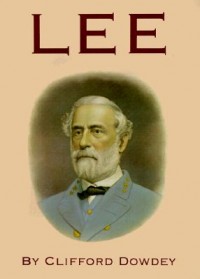
An older generation of Southern biographers were often guilty of making gods out of such men as Stonewall Jackson and R. E. Lee. If we are going to profit from reading biographies about the great men and women of the past, we will need to have insight, which is nothing more than the ability to assess one's own and others' strengths and weaknesses in a healthy sort of way. Insight is a part of biblical wisdom, which of course only God can grant us; but it is an essential part of the Christian's equipment.
1:58 PM Today in the gathering brother Joel taught about the memorial significance of the Lord's Supper and suggested that perhaps -- just perhaps -- our church should observe the Supper on a weekly basis. It's my opinion that a strong case can be made from the Scriptures for a weekly observance, and indeed a return to such a practice would, in my mind, restore the Supper to the heart, rather than the periphery, of our weekly gatherings. I recall once reading a book by Robert Webber (of Wheaton College) documenting the exodus of evangelicals from traditional evangelical denominations, partly because they had become attracted to the weekly Eucharist practiced by many of the more mainline denominations. His book, Evangelicals on the Canterbury Trail, directly addressed one of the greatest problems I see in many of our churches, namely our anthropocentrism (read pulpit-centeredness). As I've remarked before on this blog, some point the finger at us for having a faulty view of the Trinity (Father, Son, and Holy Bible). In other words, we seem to have elevated a 30 minute monologue to a place of importance and preeminence it never had in the New Testament, at least not so far as I can tell. Apparently the early church met weekly to observe the Lord's Supper (at that time it was part of a full fellowship meal) -- see Acts 20:7, 1 Cor. 11:20, and Acts 2:42. Should Bethel Hill Baptist Church be any less regular than the early church in this regard?
I, for one, would love to see us refocus our meetings on the Lord Jesus, our absent but soon-to-return Savior. I, for one, would love to see us become less man-centered, even less pulpit-centered in the sense that we have elevated a sermon above the Sermo that was in the beginning with the Father. (One version of the Vulgate renders John 1:1 as In principio erat Sermo instead of In principio erat Verbum. I like that.) I personally advise against giving into the thinking that says "If we partake of the Lord's Supper weekly it will become mundane and lose its significance." Hogwash. Would anyone say that about weekly prayers or even our weekly "messages" from God's Word? You say, "There is no possible way we could fit all of this within a one-hour meeting." You are right. But then again, the early church seemed to be in no hurry to get over with their services so that they could all go home and watch a game on TV. They seemed to luxuriate in the fellowship their meetings provided.
Churches that have a weekly observance of the Lord's Supper stand in the tradition of the apostles. No church ever suffers for doing this. Indeed, it may just bring a special blessing from the One whom we remember.
7:48 AM I am very excited. A week from today I begin teaching a new Greek class. In a local church no less. Mount Pleasant Baptist Church in North Wilkesboro, NC, has invited me to kick off their Greek class. Sunday morning I will introduce chapter 1 of our beginning grammar (why study Greek?, the alphabet, etc.). Then, on Sunday evening, I will introduce the Greek verb system (chapters 2-3) and on Monday evening the Greek noun system (chapter 4). From that point on, the class will use our Greek DVD series to teach themselves the language, meeting weekly for several months. Can you see, now, why I am so excited?
I think I can safely predict one thing about the class. It will take more time and effort than most any other activity in your life. Learning Greek requires mountains of perseverance; discouragement is an occupational hazard. And the first test begins on day one -- counting the cost. Perseverance implies more than "I'm willing to grin and bear it until I get the job done." It also implies the willingness and the capacity to discipline yourself to accomplish something worthwhile. When you exhibit such perseverance it will become evident to others in your congregation that learning Greek is costing you something, and this is very important for others to see. It's the equivalent of a hundred sermons on "The Need for Perseverance in the Christian Life."
We Greek teachers sometimes have developed the habit of making things difficult for our students. Greek is actually a very easy language to learn -- as long as you are properly motivated and led. You'll need to rely on the help of the Holy Spirit as never before. Undisciplined people usually experience great frustration and unhappiness taking Greek; if they can't change they end up dropping out like flies. The most useful attitude to develop is perhaps humility. It takes humility to recognize our need for faith, patience, and endurance. But all these qualities -- and many more indeed -- are available to each one of us through the presence of Christ in our lives.
To each of my students at MPBC, may I say how much I look forward to serving you in the days and months ahead. I will be available to answer any of your questions by phone or email. "How can I help you?" is a question I often ask in class. Please take me up on it if you stumble along the way.
7:21
AM
Here's a bit of trivia you might not have known about me: I once
considered becoming a missiologist. In fact, in 1978 I met with the
great German missiologist
Peter Beyerhaus
(pictured) in Tübingen where we discussed the possibility of me
doing a Ph.D. under him in the area of missions. My dissertation topic
was going to be on the history of Christian missions in the Hawaiian
archipelago, a fitting topic for someone who was
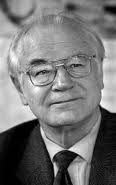 hatched
and raised in the Islands. Dr. Beyerhaus very kindly informed me that he
was willing to work with me should I decide to enter Tübingen as a
doctoral student. (As you know, I eventually chose New Testament as my
major field of study and ended up in Basel instead.)
hatched
and raised in the Islands. Dr. Beyerhaus very kindly informed me that he
was willing to work with me should I decide to enter Tübingen as a
doctoral student. (As you know, I eventually chose New Testament as my
major field of study and ended up in Basel instead.)
Another piece of trivia: Today I am becoming the missiologist that I have always wanted to be. Not in any professional sense, of course. I have neither the time nor the patience to pursue another doctorate, nor do I feel it's necessary to be credentialed to serve Christ as an educated "layperson." If a cobbler could become a missions catalyst, why not a student of ancient Greek? And if I should occasionally give up the comforts of the U.S. for the hardships of Alaba or Burji, this is nothing to boast about: it is the way of the missionary to be willing to do whatever, wherever.
A point that Andrew Walls makes in his The Missionary Movement in Christian History is that missions studies should not exist for themselves. It is impossible, he argues, to separate missiology from the other academic disciplines. The biggest obstacle is institutional: we have compartmentalized and professionalized "missions studies" instead of seeking to cross-fertilize our thinking about missions with the other theological disciplines (thus developing, for example, a missiological Christology, a missiological ecclesiology, etc.). I don't want to give the impression that I am against sub-disciplines such as New Testament, Evangelism, or Church History. The problem, as I see it, is that our colleges and seminaries have lost sight of where they ought to be heading. (This is also true of many of our churches.) There has been no setting of priorities along missiological lines. Our sub-disciplines have therefore taken on a life of their own. It ought to be apparent that missions is central to the biblical revelation. Then why should it be marginalized?
The devil cannot stand it when we get rid of our hidden academic pride and prejudice and make a real commitment to doing what God wants us to do with our lives.
Saturday, April 9
7:24 PM Allan Bevere's recent post The Totalizing Agenda of Empire has really got me thinking. One thing that was emphasized at the Wheaton Theology Conference was that no one can ever completely transcend his or her culture. It is who we are. Yet by living abroad, or at least distancing ourselves from our culture, we can gain an objectivity that is otherwise impossible. If we are to be missionaries to our own culture as well as to the world, perhaps we need to subdue our nationalistic pride, superiority, and paternalism and receive the mind of Christ. This is a life-long process, but a good place to start might be to try and understand our own political system -- its distinctives, its strengths, and its weaknesses -- and to try and understand that there are any number of basic differences between the West and most Third World cultures. For example, certainly American missionaries should bend over backwards to be fair in our criticism of our own government (as Allan notes). Republican Christians tend to minimize the evils of capitalism and militarism, while Democratic Christians may turn a blind eye to the evils of socialism and the welfare state. Political loyalties affect our basic assumptions and values. They color the way we think and react. It is therefore important to distinguish between the idealized image of the U.S. as a "city on a hill" and the power ball political activities practiced by both major political parities. Nor should we idealize any one political figure, whether of the Right or the Left, whether he be Lech Walesa or Mahatma Gandhi. In our day I still see young people over-idealizing someone like Gandhi who (as Jacque Ellul has pointed out) promoted non-violence only to establish the oppressive power of the Indian state. As I see it, here we have an incredible betrayal of the Christian ideal as espoused by Jesus, and the source of this betrayal is undoubtedly the tendency to falsely interpret Romans 13 as teaching blind obedience to authority. Leaders in the church bear great responsibility for communicating with their flocks about this danger and inviting them to think critically about all aspects of culture. How easy it is to retreat into our cultural milieu when we really need to be probing ways to reach the people of the world we're here to serve. Even at the theology conference I detected a "we versus they" attitude, the "we" of course being those of us who are committed to thinking biblically about Christ and culture, and the "they" being the masses of common everyday believers who fail to theologize about such important matters! It takes an active effort of the will to overcome such egocentrism.
Do read Allan's essay if you can. Let us remember that all of us Christians, whether Republicans or Democrats or Independents, will one day stand before the same God. If we learn to focus on our similarities, perhaps the differences will begin to fade into the background.
7:14 PM Becky brought some injera back from Chicago so I was treated, for a second night in a row, to some wonderful Ethiopian fare. Never has food tasted better.
4:16 PM Odds and ends ...
1) Henry Neufeld offers his perspective on burning Muslim books.
2) Fellow surfers of the world, check out this essay about "soul surfer" Bethany Hamilton, who lost an arm to a shark.
3) Most evangelicals say tithing is not required.
4) Should the Greek word apostolos be rendered as "missionary"? Join the discussion here.
5) Restored Saint Francis of Assisi tomb reopens.
6) Here's video of the incredible 48-foot wave that crippled Japan's Daiichi power plant.
3:38 PM We just got back to the farm after traveling to Wheaton/Chicago. It was a great trip. Here are but a few of many lasting impressions:
1) All of the conference speakers were interesting and some were quite witty. My favorite was the keynote speaker Andrew Walls. I even bought several of his books.
2) I greatly enjoyed the ethnic diversity of west Chicago. Becky and I had Thai, Vietnamese, Chinese, and Ethiopian food, not to mention traditional American cuisine. Oh, and that Mongolian Barbeque was out of this world.
3) Everywhere we went the service was outstanding -- from the hotel desk clerks to the restaurant servers to the car rental people. Chicago is very service-oriented and people-friendly.
4) I met Karen Jobes (Professor of Greek at Wheaton) for the first time. Karen and I go way back. She was kind enough to say some very kind words about my doctoral dissertation when it was published in 1984. I have watched her develop into a first class LXX scholar and we used her textbook in our Septuagint class last semester. Nice to meet you, Karen!
5) A special treat was visiting the grounds of the famous College Church in Wheaton, adjacent to the campus, where Becky's uncle Dexter McClenny served as pastor for many years in the 1970s.
6) Do not drive in greater Chicago if you don't like potholes and decrepit roads.
7) We had dinner not once but twice with two brothers that hail from -- of all places! -- Burji in Southern Ethiopia. Both of them were very outspoken about the debt they feel they owe to Becky's parents for bringing their people the Gospel back in the 1950s-1960s. Over dinner last night (in a wonderful Ethiopian restaurant in downtown Chicago) we had them speak with Becky's dad in Dallas via cell phone. What a blessing!
8) I know of no more beautiful sight than Shoreline Drive along Lake Michigan and the lights of the city at 9:00 pm. Chicago's skyline is both unique and beautiful.
9) Not once was I asked, by any of the conference speakers, to open my Bible.
10) Finally, in Wheaton's Blanchard Hall we noticed a marvelous plaque honoring those Wheaton graduates who went on to serve on the foreign mission field. Bradford Lapsley, Becky's father, was on the list (class of 1948), as well as Becky's cousin by marriage, Claire Grieve (McClenny). Claire and her husband were killed by the Italians at the beginning of World War II.
Here are a few pix in case you're interested. Below is Andrew Walls, Professor Emeritus of the Study of Christianity in the Non-Western World at the University of Edinburgh. He was kind enough to inscribe two of his books for me. His tome The Missionary Movement in Christian History is a missions classic.
Here's Becky standing in front of the historic College Church in Wheaton. Inexplicably the church's website says nothing about several of its former pastors, including Becky's uncle Dexter.
Abraham (right) and Yohannes from Burji. They "just happened" to stumble across our website last week, and we "just happened" to be staying in a hotel within 2 miles of their home in Carol Stream. Amazingly, Yohannes studied in the same school house that Becky's father taught in back in the 1960s.
Enjoying injera b'wat in old Chicago.
Here is the "Alumni in Missions" plaque I mentioned above. It clearly states that the names are those of "graduates," but Becky's dad only spent two years at Wheaton before finishing his bachelor's degree at SMU in Dallas. We, of course, felt it our duty to report the mistake to the alumni office.
Below you will see the name of James (Jim) Elliott marked with a cross. The cross indicates those who died in missionary service.
We thus had to point out another mistake to the alumni office, as Claire Grieve was martyred for Christ in the Sudan, and her memory should have been honored with a cross.
Here are two contrasting (and a bit disturbing) pictures. Below you see the names of the class of 1948. There are 100 names in all, 40 of them the names of women. Brad Lapsley's name can be seen about halfway down the right-hand column.
In stark contrast, note the greatly diminished number of missionary names in the year 1998.
In just 50 years, the number of Wheaton graduates going to the mission field was reduced to a mere 19, 14 of whom are women.
I'll have more to say about the conference later. But I'm glad I went. Becky and I had a wonderful time renewing old friendships and making many new ones. To be quite frank with you, I chose to attend this year's conference over last year's, despite the fact that the one-and-only N. T. Wright was last year's keynote speaker. I personally see no conflict whatsoever between forensic, juridical justification (a doctrine I believe the Bible teaches and one I wholeheartedly affirm) on the one hand, and the corporate and even communal nature of justification (a doctrine the Bible also teaches but one we conservative evangelicals often overlook or underplay) on the other. A conference that brought together lecturers from the world over, including renowned historians of Christian missions, and that shows how the central question of Christianity has always assumed various identities in different cultures, was of much greater interest to me. I suppose the conference papers are now online (either as audio or video files), and I cannot help but ask you to carefully consider watching at least a few of them. Your faith will be strengthened and, hopefully, your commitment to the challenging task of world evangelization will be deepened.
Before I forget: My heartfelt thanks to the administration of SEBTS and their generous faculty development fund for making this trip possible.
Wednesday, April 6
6:40 AM Becky and I are excited to be attending the Wheaton Theology Conference on global theology and missions. Missions is a huge subject. Almost every nation on earth has become a sending nation. The balance of world missions has shifted to the Majority World. Missions today is truly international. Wherever missionaries go -- and we are all missionaries -- they are finding the work of missions to be one of the most rewarding and joyous aspects of Christian living. And that really is the heart of the matter. Our God is a sending God, and I suppose very little brings Him more joy than to see His children obeying His Son's commission. Every one of us is sent, just as Jesus was sent. The only qualification is that we have Jesus' love, His heart of compassion for the multitudes. This love is absolutely necessary if our service is to be acceptable and useful to God. If we love the world, our love will be embodied in loving and sacrificial service. God is opening doors worldwide. Even the most "restricted" countries can be entered by teachers, tourists, and tentmakers. Even the U.S. is a mission field. There is no biblical basis for elevating the "foreign missionary" to a superior status over the "home missionary." "Life is a mission trip," says my friend Alvin Reid. All we need to do it take it. We are called -- all of us -- to be Christ's witnesses by word and deed.
I make no pretensions of having learned everything I want to know about missions. This week Becky and I will be meeting with people who are preeminently engaged in the work of global evangelization. They are not "super" Christians. They have the same spiritual equipment as any other follower of Jesus. All of us are mere earthen vessels. But all of our money, all of our time, our entire being belongs to God. The work of missions is His, but -- miracle of miracles -- He has chosen us to accomplish it through us.
Please pray for and with us that we may all walk away from this conference with a renewed conviction that there is no higher of more glorious calling than that of being a missionary of the Lord Jesus Christ.
Tuesday, April 5
8:04 PM Odds and ends ...
1) Andy Bowden is really enjoying his stay in Munich. Check out his fabulous photos here.
2) If your church is moving toward an elder-led model of leadership, do check out this post by Arthur Sido: What is the right number of elders? You say, What? Another essay on elders? It would not be needed if we got back to the simple pattern of the New Testament. Read Arthur's essay and then jump into the discussion.
3) Click here for another published defense of the Pauline authorship of Hebrews. Of course, the book was published in 1836. Does that make me an obscurantist or what?
4) Hope to meet up with some Ethiopians in Chicago tomorrow for dinner. Hope we can find a good Ethiopian restaurant near Carol Stream.
5) Conference announcement: Discipleship and Freedom: Bonhoeffer Then and Now.
6) Paul Himes discusses patriotism and the church. Dispensationalists, take note!
Monday, April 4
9:08 PM Well now, looks who's calling my blog the un-pseudo-blog-type-thing. The nerve! Let's set the record straight. My site is the ultimate Unter-Blog (opposite of Über-Blog)!
8:56 PM The hallmark of Jesus' upside-down kingdom is the willingness to sacrifice for the Gospel. First Baptist Church Murphy (TX) is a congregation that grasps that concept. Becky and I are one of two couples the church supports (they contribute, not to our needs, but to the needs in Ethiopia). The other couple are the Grays. So there you have it -- the Blacks and the Grays! A week ago Sunday we joined together in a fellowship of praise and support and reporting of what God is doing in the faraway Horn of Africa. I even had the audacity to try and teach the congregation a praise song in Amharic. That's one reason I love the church so much -- we can laugh at ourselves and our feeble efforts. The Good News of Jesus Christ welcomes all into the crazy, zany kingdom!
Below: Don and Sharon Cole, former missionaries to Brazil, now shepherding the flock in Murphy, Texas.
Becky giving an update on the persecution and the opportunities in Ethiopia.
5:32 PM This week we are in Mark chapter 10, where Jesus' pronouncement against divorce and remarriage figures prominently. We live in a world where divorce and remarriage are AOK whereas marriage was intended by God to be permanent. Remarriage while the partner is still alive is adultery, and Jesus would be appalled at the ease and frequency with which it takes place. To one and all (myself included) Jesus' words present a firm rebuttal to our cultural addiction to serial polygamy.
5:23 PM For the early church, prayer was a way to discover God's will, not to change it (Acts 4:25-26).
5:17 PM Arthur Sido attempts to define a very difficult term: institutional church. I think we have a good deal to learn from him in this regard. The immensity of the subject strikes me more and more the older I get. What a privilege it is to belong to a Body that supersedes and transcends all visible forms of expression.
4:06 PM Last week I had another request for .pdfs of my essays on the Pauline authorship of Hebrews. Happy to send them out. Let me know if you're interested.
3:57 PM My favorite sight of the day: Papa Duck swimming in the pond, faithfully guarding Mama Duck while she sits on her eggs.
12:52 PM Have you ever visited THE Seminary? I'm referring to Dallas Theological Seminary of course. I know of no alumni who are more devoted to their alma mater than DTS grads, my father-in-law included. And they have every right to feel this way. I'm especially impressed by the DTS library. Last week I spent several hours in the stacks perusing the myriads of Th.M. and Ph.D. theses that our library at SEBTS lacks. One of the dissertations I stumbled upon was written by James Slaughter, who eventually went on to publish a synopsis of his findings in a wonderful essay entitled "Peter's Instructions to Husbands in 1 Peter 3:7." This short essay, which could easily be read in a mere 30 minutes, is outstanding. Men, get your hands on it if you can. It appeared in the book Integrity of Heart, Skillfulness of Hands: Biblical and Leadership Studies in Honor of Donald K. Campbell, edited by Charles Dyer and Roy Zuck. The bibliographical introduction was written by none other than the man himself, Howard Hendricks, who is still going strong despite losing an eye to cancer. (I "just happened" to bump into him in the seminary library.)
But back to the essay. My main takeaway from Slaughter's chapter was a renewed realization that the entire book of 1 Peter is all about what to do when treated unfairly. What are believers to do when they face unfair circumstances? The answer, according to Peter, is to display a spirit of deference. Peter expects Christians to behave with deference when facing unjust persecution (2:11-12), unjust legal affairs (2:13-17), unjust domestic affairs (including marriage; 2:18-3:7), unjust civil affairs (3:8-4:19), and unjust church affairs (5:1-9). When believers encounter harsh, unfair circumstances, they are to "seek peace and pursue it" (3:11) and follow the example of Christ and not commit the sin of unrighteous anger and unforgiveness. In unfair circumstances, when we are tempted to become defensive, self-justifying, and retributional toward others, Peter urges us to behave with respect, kindness, and understanding, that is, to reflect a spirit of deference. We are never to accuse, castigate, or intimidate others or threaten them in a rude, patronizing, or contemptuous way. Though we might confront them in a loving way, we are to be accepting, forgiving, and unwilling to hold a grudge.
Wow. Talk about raising the bar! As you can see, Slaughter makes the word "deference" a key to his understanding of the book of 1 Peter. What does the word mean? According to Slaughter, it conveys the idea of thoughtful consideration of another person's wishes or desires, a courteous and respectful regard for another's wishes, and a spirit of humility. It does NOT necessarily connote agreement, passivity, or acquiescence, though it does rule out any thought of retaliation or vindictiveness.
Do Christians ever face unjust circumstances? I imagine only about 99 percent of us! When we are treated unfairly, we should follow Christ's example. That is a hard truth. And believe me, I'm not writing these words for anyone other than myself. Opportunities to show Christ-like deference abound, if only we will take them. This love for one another is crucial. Without it there can be no church. Until the world sees in Christian circles a warmer and more accepting fellowship than anything it can find anywhere else it is not going to be impressed in the least with all our talk about Jesus and forgiveness.
It's a point worth pondering.
11:54 AM Odds and ends ...
1) Click here to read the schedule of the 2011 Wheaten Theology Conference that begins this Thursday. The theme is "Global Theology in International Perspective." Becky and I leave for the conference this Wednesday and hope to meet up with many missionary-minded friends there.
2) Eric Carpenter calls on Christians to take a stand. Read Too Much For Any One Man. The New Testament gives no suggestion that there is any distinction between clergy and laypeople. All Christians are called upon (and expected) to minister. In the New Testament, moreover, leaders came from within the Body and their leadership was always corporate and shared. There are few aspects of Christianity that demand a more radical reappraisal than its ecclesiology, if we are to be obedient to the call of Christ. If we are prepared to take the Scriptures seriously as the foundational documents of our faith, this will mean a complete rethinking of the wineskins and a return to the guidelines for Christian ministry as set down in the New Testament.
3) Nice little serendipity: The weather, through windy, if perfect for working on the pasture fencing and horse (soon to be donkey) barn. Makes me want to go outdoors and get filthy dirty.
4) Signs of the time ... several mid-Michigan Muslims and Arab-Americans speak out against the Qu'ran burning in Florida, thus joining their voice to that of the evangelical community. Our forefathers in the faith were accused of "turning the world upside down" (Acts 17:6), but it was not by shallow and offensive acts.
5) Check out Jesus.com.
Sunday, April 3
6:44
PM
Lloyd Ogilvie, one-time chaplain to the U.S. Senate, once had a serious
accident while on study leave in Scotland. One afternoon he was walking
on the beach when he fell
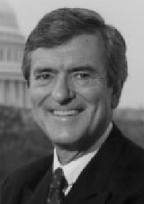 between
some rocks and broke one of his leg bones. Almost fainting with pain, he
managed to crawl for several miles until he found help. The break
required many months of recuperation in a hospital in Scotland.
between
some rocks and broke one of his leg bones. Almost fainting with pain, he
managed to crawl for several miles until he found help. The break
required many months of recuperation in a hospital in Scotland.
During that time Ogilvie confronted what he called the "seduction of the secondary." Alone with his pain, and away from the strain of his work, he was reminded of the preeminent need to have a close walk with God, to live for the Gospel, and to find his identity solely in Christ and not in any other human being.
What is life all about when God removes all the scaffolding? In Phil. 1:10, Paul puts it this way: "You must discern what is of utmost importance in life." For years I believed that scholarship was primary. It was all too easy to succumb to the pressure to be relevant, spectacular, and powerful. Jesus faced these same three temptations (Matt. 4:1-11). Twenty-one centuries later, they still confront every Christian. Satan may show us the poverty of the world and tempt us to become humanitarians. Or he might suggest that if we did something spectacular we could win the world. Of he might allure us with the sweet promise of power. Jesus felt the pull of the devil's suggestions, and so will we. There is perhaps nothing inherently sinful about being relevant, spectacular, or powerful. But what is good can often become the enemy of what is best. If we are to put the kingdom of God first, we must turn a deaf ear to other calls.
Tragically, it often takes a "severe mercy" in our lives before God gets a hold of us and we begin to affirm God (rather than success or relevance) as the only source of our identify as Christians. A few years ago I stood at the place in Bucharest where the brutal dictator Nicolae Ceausescu and his wife were executed because of their abuse of power. Contrast that with a scene in Alaba, Ethiopia, where in 2005 I had gone to meet the parents of a 19-year old who had been murdered for his faith. There I met a man named Tesfai whose 8-year old daughter had just been beheaded by the enemies of the cross. I asked him what I could pray for. Instead of asking for money or safety he responded, "Pray that I might be loving and forgiving like Jesus." There was nothing "relevant," "spectacular," or "powerful" about Tesfai. But here was a man who had his priorities right. Jesus did not come to condemn the world but to save it. And His mission is to be carried on through His disciples. Like Jesus, we are to do the Father's work and announce the Father's kingdom, and we are to do this by loving all people, even those who hate us.
As I write these words my life expectancy is about 20 years. I want to commit myself for these 20 years to doing all I can to reconcile lost sinners to God, to themselves, and to one another. If my scholarship can contribute to this end, then I am content to continue teaching and writing books. But never again can my focus be on academics. The human problem is essentially a problem of the heart. Forgiveness of sin is at the root of Jesus' radical message. And with the forgiveness of sin the Gospel also brings an empowering liberation from the seduction of those secondary things in our lives that pull us away from reality.
Friends, a time comes when each of us must reevaluate our priority system. Life is too short to live it for temporal dreams.
6:23 PM Our Student Day was fabulous, despite the fact that we lost power to the farm at around 11:00. Electricity was eventually restored at 11:30 pm. Lights were no problem, but without the water pump working, toilets were sorely missed. As Becky said, "It was a memory building experience." So grateful for our students. They are eager to follow Jesus in obedience even if it means inconvenience and loss of the "good life." Here's Becky making some pre-lunch announcements. Yes, she got lots of well-deserved complements about her hair. God is good!
Saturday, April 2
8:14 AM Odds and ends ...
1) Is it wrong to have dialog during the gathering of the church? Eric Carpenter has been studying this issue for some time and offers his viewpoint here.
2) Click here to read why the Qu'ran burning in the U.S. was such big news in Afghanistan.
3) Writing from Singapore, Tony Siew reflects on the disaster in Japan from a biblical perspective.
4) Brian Fulthorp wants to live the Lord's Prayer, not just recite it.
5) Today's weather for our Student Day? Bright sunshine and a temp of 70 degrees. Come one, come all!
Friday, April 1
1:56 PM News and notes from Ethiopia:
1) Ethiopia to get its first seaport in 20 years. But at what price?
2) The lack of a midwife cost Liknesh her baby. Read One million lives lost to midwife shortage.
3) Interracial marriage is on the rise in Ethiopia.
4) India and China team to up to build a new railway system in Ethiopia.
5) The Majang tribe now has its own Bible.
1:43 PM This morning I did some chain sawing and fence repairing. Yes, you may call me Alpha Mensch.
8:12 AM Here's a question for all of you under-30 New Testament students/scholars. Have you read the Reicke Festschrift yet? You simply must. It represents the very best in New Testament scholarship of a previous generation. In 2 volumes you'll find essays by Barrett, Black (as in Matthew Black), Bruce, Caird, Davies, Gerhardson, Klijn, Marshall, Michel, Morris, Robinson, Torrance, van Unnik, and many others. I see you scratching your head and asking, "Who in the world are they?" All the more reason for you to read this book. In the preface Oscar Cullmann notes that we usually read the writings of other scholars in order to criticize or evaluate their arguments (and then write our book reviews). Instead, writes Cullmann, our first question should be "What do I have to learn from him, what do I have to thank him for?" ("Was habe ich von ihm gelernt, was habe ich ihm zu verdanken?").
You'll find the book at Amazon under the title The New Testament Age.

8:06 AM Listen to the Bible in your language (including Amharic).
7:56 AM The following tale is for all of you teachers who give your students take-home exams (as I do) and don't worry about anyone cheating. Edward Coray, in his delightful memoir The Wheaton I Remember, tells the story about then-president Charles Blanchard.
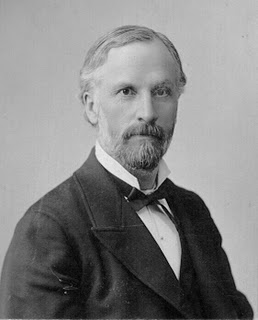
President Blanchard had a strict policy that students were to keep off the grass and stay on the campus sidewalks. One day Edward Coray had overslept and found himself cutting across campus -- on the grass no less -- to make his 8:00 o'clock class. To his horror he saw President Blanchard on his way out of his office to meet him. (From his office window the president had seen Coray running on the grass.) With a big smile the president approached Coray, shook his hand warmly, and said, "You're my friend from the coal regions of Pennsylvania, aren't you?" Coray nodded his head sheepishly. President Blanchard continued: "I came here to ask you something. If you should encourage all of your friends to keep off the campus grass and I should do the same, do you think it would help?" Coray replied, "Yes, Mr. President, I think it would." "Will you do this?" asked the president. "Yes, I'll be glad to," said Coray. With another big smile President Blanchard said, "Thank you so much. Now hurry along to class. The Lord bless you and give you a good day."
Coray never walked on the campus grass again.
Below: Blanchard Hall on the campus of Wheaton College.

